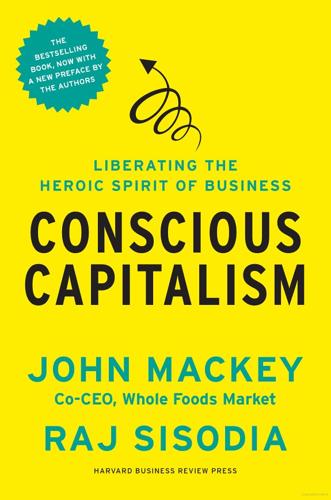
Conscious Capitalism, With a New Preface by the Authors: Liberating the Heroic Spirit of Business
by
John Mackey
,
Rajendra Sisodia
and
Bill George
Published 7 Jan 2014
I first discovered John Mackey’s philosophies when I read his 2005 debate with Nobel Prize–winning economist Milton Friedman about the way capitalism works. Shortly before Friedman’s death, Mackey challenged his view that the only responsibility of business is to its shareholders, which financial markets have translated into its short-term stock price. In his widely quoted 1970 treatise in the New York Times, “The Social Responsibility of Business Is to Increase Its Profits,” Friedman excoriated business leaders who were concerned about their employees, communitied, and the environment: “Businessmen that take seriously their responsibilities for providing employment, eliminating discrimination, avoiding pollution … are preaching pure and unadulterated socialism.”
…
Some people view this type of philanthropy as a form of theft from investors. They say, “If you feel altruistic toward other people, you should exercise that altruism with your own money, not with the assets of a corporation that don’t belong to you.” This view was famously articulated by Milton Friedman in 1970 in his essay “The Social Responsibility of Business Is to Increase Its Profits”: “There is one and only one social responsibility of business—to use its resources and engage in activities designed to increase its profits so long as it stays within the rules of the game, which is to say, engages in open and free competition without deception or fraud.”1 At first glance, this position sounds reasonable.
…
Terri Kelly, telephone interview with authors, March 23, 2012. 6. Sally Jewell, telephone interview with authors, March 23, 2012. 7. John A. Byrne, World Changers: 25 Entrepreneurs Who Changed Business as We Knew It (New York: Portfolio/Penguin, 2011). Chapter Nine 1. Milton Friedman, “The Social Responsibility of Business Is to Increase Its Profits,” New York Times Magazine, September 13, 1970. For an interesting debate on corporate social responsibility, see Milton Friedman, John Mackey, and T. J. Rodgers, “Rethinking the Social Responsibility of Business,” Reason, October 2005, http://reason.com/archives/2005/10/01/rethinking-the-social-responsi. 2.
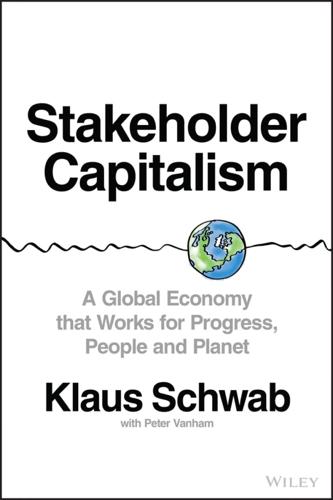
Stakeholder Capitalism: A Global Economy That Works for Progress, People and Planet
by
Klaus Schwab
Published 7 Jan 2021
But despite the initial enthusiasm for the Davos Manifesto and the stakeholder-centered approach it advocated, a narrower shareholder-centric paradigm prevailed, particularly in the United States. It was the one put forth by University of Chicago economist and Nobel Prize winner Milton Friedman starting in 1970. He held that the “only social responsibility of business is to increase its profits”20 and that free markets are what matters above all else. (This is discussed further in Chapter 8.) The result was unbalanced growth. Economic growth returned in the 1980s, but an ever smaller part of the population benefited from it, and even more harm was done to the planet to achieve it.
…
locations=SA. 14 Global Gender Gap report 2018, http://reports.weforum.org/global-gender-gap-report-2018/key-findings/. 15 “Historical Background and Development Of Social Security,” Social Security Administration, https://www.ssa.gov/history/briefhistory3.html. 16 Tuberculosis Treatment, Mayo Clinic, https://www.mayoclinic.org/diseases-conditions/tuberculosis/diagnosis-treatment/drc-20351256. 17 The term “global village” was coined by Canadian thinker Marshall McLuhan in the 1960s. 18 “The World Economic Forum, a Partner in Shaping History, 1971–2020,” p.16 http://www3.weforum.org/docs/WEF_A_Partner_in_Shaping_History.pdf. 19 The Davos Manifesto, 1973, World Economic Forum, https://www.weforum.org/agenda/2019/12/davos-manifesto-1973-a-code-of-ethics-for-business-leaders/. 20 “A Friedman Doctrine—The Social Responsibility of Business Is to Increase Its Profits,” Milton Friedman, The New York Times, September 1970, https://www.nytimes.com/1970/09/13/archives/a-friedman-doctrine-the-social-responsibility-of-business-is-to.html. 21 The New York Times Magazine, “What Is Fukuyama Saying? And to Whom Is He Saying It?”, James Atlas, October 1989, https://www.nytimes.com/1989/10/22/magazine/what-is-fukuyama-saying-and-to-whom-is-he-saying-it.html. 22 “Pioneers in China,” 1993, ZF Heritage, zf.com/mobile/en/company/heritage_zf/heritage.html. 23 Eurofound, “Pacts for Employment and Competitiveness: Ravensburger AG,” Thorsten Schulten, Hartmut Seifert, and Stefan Zagelmeyer, April 2015, https://www.eurofound.europa.eu/es/observatories/eurwork/case-studies/pecs/pacts-for-employment-and-competitiveness-ravensburger-ag-0. 24 GDP Growth, Annual (%), 1961–2019, The World Bank, https://data.worldbank.org/indicator/NY.GDP.MKTP.KD.ZG. 25 International Monetary Fund, New Data on Global Debt, https://blogs.imf.org/2019/01/02/new-data-on-global-debt/. 26 Gross debt position, Fiscal Monitor, April 2020, International Monetary Fund, https://www.imf.org/external/datamapper/datasets/FM. 27 Global Footprint Network, https://www.footprintnetwork.org/2019/06/26/press-release-june-2019-earth-overshoot-day/. 2 Kuznets’ Curse : The Issues of the World Economy Today There might have been no better person to piece together the puzzle of the world economy today than Simon Kuznets, a Russian-born1 American economist, who died in 1985.
…
Johnson, Frank Freidel and Hugh Sidey, White House Historical Association, 2006, https://www.whitehouse.gov/about-the-white-house/presidents/lyndon-b-johnson/ 42 Term coined in “Capitalism, Socialism and Democracy”, Joseph Schumpeter, Harper Brothers, 1950 (first published 1942) 43 “A Friedman Doctrine—The Social Responsibility Of Business Is to Increase Its Profits,” Milton Friedman, The New York Times, September 1970, https://www.nytimes.com/1970/09/13/archives/a-friedman-doctrine-the-social-responsibility-of-business-is-to.html. 44 Global Income Distribution From the Fall of the Berlin Wall to the Great Recession, Christoph Lakner and Branko Milanovic, World Bank, December 2013, http://documents.worldbank.org/curated/en/914431468162277879/pdf/WPS6719.pdf 45 “Deconstructing Branko Milanovic's ‘Elephant Chart’: Does It Show What Everyone Thinks?”
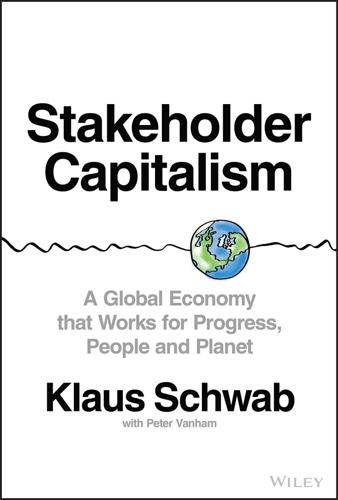
Stakeholder Capitalism: A Global Economy That Works for Progress, People and Planet
by
Klaus Schwab
and
Peter Vanham
Published 27 Jan 2021
But despite the initial enthusiasm for the Davos Manifesto and the stakeholder-centered approach it advocated, a narrower shareholder-centric paradigm prevailed, particularly in the United States. It was the one put forth by University of Chicago economist and Nobel Prize winner Milton Friedman starting in 1970. He held that the “only social responsibility of business is to increase its profits”20 and that free markets are what matters above all else. (This is discussed further in Chapter 8.) The result was unbalanced growth. Economic growth returned in the 1980s, but an ever smaller part of the population benefited from it, and even more harm was done to the planet to achieve it.
…
locations=SA. 14 Global Gender Gap report 2018, http://reports.weforum.org/global-gender-gap-report-2018/key-findings/. 15 “Historical Background and Development Of Social Security,” Social Security Administration, https://www.ssa.gov/history/briefhistory3.html. 16 Tuberculosis Treatment, Mayo Clinic, https://www.mayoclinic.org/diseases-conditions/tuberculosis/diagnosis-treatment/drc-20351256. 17 The term “global village” was coined by Canadian thinker Marshall McLuhan in the 1960s. 18 “The World Economic Forum, a Partner in Shaping History, 1971–2020,” p.16 http://www3.weforum.org/docs/WEF_A_Partner_in_Shaping_History.pdf. 19 The Davos Manifesto, 1973, World Economic Forum, https://www.weforum.org/agenda/2019/12/davos-manifesto-1973-a-code-of-ethics-for-business-leaders/. 20 “A Friedman Doctrine—The Social Responsibility of Business Is to Increase Its Profits,” Milton Friedman, The New York Times, September 1970, https://www.nytimes.com/1970/09/13/archives/a-friedman-doctrine-the-social-responsibility-of-business-is-to.html. 21 The New York Times Magazine, “What Is Fukuyama Saying? And to Whom Is He Saying It?”, James Atlas, October 1989, https://www.nytimes.com/1989/10/22/magazine/what-is-fukuyama-saying-and-to-whom-is-he-saying-it.html. 22 “Pioneers in China,” 1993, ZF Heritage, zf.com/mobile/en/company/heritage_zf/heritage.html. 23 Eurofound, “Pacts for Employment and Competitiveness: Ravensburger AG,” Thorsten Schulten, Hartmut Seifert, and Stefan Zagelmeyer, April 2015, https://www.eurofound.europa.eu/es/observatories/eurwork/case-studies/pecs/pacts-for-employment-and-competitiveness-ravensburger-ag-0. 24 GDP Growth, Annual (%), 1961–2019, The World Bank, https://data.worldbank.org/indicator/NY.GDP.MKTP.KD.ZG. 25 International Monetary Fund, New Data on Global Debt, https://blogs.imf.org/2019/01/02/new-data-on-global-debt/. 26 Gross debt position, Fiscal Monitor, April 2020, International Monetary Fund, https://www.imf.org/external/datamapper/datasets/FM. 27 Global Footprint Network, https://www.footprintnetwork.org/2019/06/26/press-release-june-2019-earth-overshoot-day/. 2 Kuznets’ Curse : The Issues of the World Economy Today There might have been no better person to piece together the puzzle of the world economy today than Simon Kuznets, a Russian-born1 American economist, who died in 1985.
…
Johnson, Frank Freidel and Hugh Sidey, White House Historical Association, 2006, https://www.whitehouse.gov/about-the-white-house/presidents/lyndon-b-johnson/ 42 Term coined in “Capitalism, Socialism and Democracy”, Joseph Schumpeter, Harper Brothers, 1950 (first published 1942) 43 “A Friedman Doctrine—The Social Responsibility Of Business Is to Increase Its Profits,” Milton Friedman, The New York Times, September 1970, https://www.nytimes.com/1970/09/13/archives/a-friedman-doctrine-the-social-responsibility-of-business-is-to.html. 44 Global Income Distribution From the Fall of the Berlin Wall to the Great Recession, Christoph Lakner and Branko Milanovic, World Bank, December 2013, http://documents.worldbank.org/curated/en/914431468162277879/pdf/WPS6719.pdf 45 “Deconstructing Branko Milanovic's ‘Elephant Chart’: Does It Show What Everyone Thinks?”
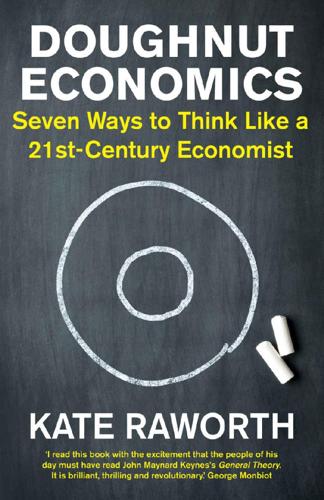
Doughnut Economics: Seven Ways to Think Like a 21st-Century Economist
by
Kate Raworth
Published 22 Mar 2017
But if mainstream business is unlikely to embrace its full potential, what kind of enterprise would be intent on making it work? There are of course many ways to design business, some of them far more regenerative than others, as visionary entrepreneurs have learned the hard way. Redefining the business of business ‘The social responsibility of business is to increase its profits,’ said Milton Friedman back in 1970 and the mainstream business world willingly believed him.46 But Anita Roddick had a different take on that. In 1976, before the words to say it had been found, she set out to create a business that was socially and environmentally regenerative by design.
…
Microsoft is using Linux to run its cloud’, http://www.wired.com/2015/09/microsoft-using-linux-run-cloud/ 44. Personal communication with Sam Muirhead, 27 January 2016. 45. Asknature.org and personal communication with Janine Benyus, 31 May 2016. 46. Friedman, M. (1970) ‘The social responsibility of business is to increase its profits’, New York Times Magazine, 13 September. http://umich.edu/~thecore/doc/Friedman.pdf 47. Satya.com (2005) ‘A Dame of big ideas: the Satya interview with Anita Roddick’, http://www.satyamag.com/jan05/roddick.html 48. Satya.com (2005) ‘A Dame of big ideas’. 49. Benefit Corporation, http://benefitcorp.net/ and CIC Association, http://www.cicassociation.org.uk/about/what-is-a-cic 50.
…
Friedman, B. (2006) The Moral Consequence of Economic Growth. New York: Vintage Books. Friedman, M. (1962) Capitalism and Freedom. Chicago: University of Chicago Press. Friedman, M. (1966) Essays in Positive Economics, Chicago: University of Chicago Press. Friedman, M. (1970) ‘The social responsibility of business is to increase its profits’, New York Times Magazine, 13 September 1970. Fullerton, J. (2015) Regenerative Capitalism. Greenwich, CT: Capital Institute Gaffney, M. and Harrison, F. (1994) The Corruption of Economics, London: Shepheard-Walwyn. Gal, O. (2012) ‘Understanding global ruptures: a complexity perspective on the emerging middle crisis’, in Dolphin, T. and Nash, D.
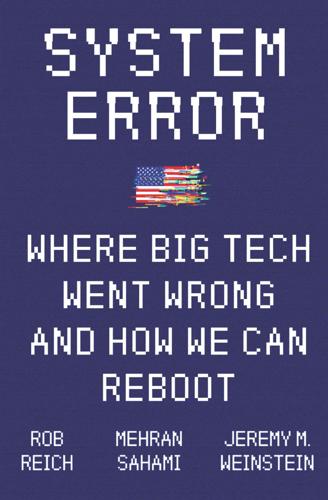
System Error: Where Big Tech Went Wrong and How We Can Reboot
by
Rob Reich
,
Mehran Sahami
and
Jeremy M. Weinstein
Published 6 Sep 2021
If the market rewards only revenue, where’s the incentive to protect democracy or other values we cherish? Hunting for Unicorns Just over fifty years ago, Milton Friedman—still six years shy of winning the Nobel Prize in Economics—penned an essay in the New York Times espousing the view that “The Social Responsibility of Business Is to Increase Its Profits.” His argument followed the basic premise that a business is beholden to its owners—shareholders in the case of public companies—and as a result should be trying only to maximize its value. He explicitly rejected the role of social responsibility in corporate governance, in part because of the difficulty of generating a quantifiable assessment of such responsibilities.
…
Ordóñez et al., “Goals Gone Wild: The Systematic Side Effects of Overprescribing Goal Setting,” Academy of Management Perspectives 23, no. 1 (February 1, 2009): 6–16, https://doi.org/10.5465/amp.2009.3700 7999. “Goals may cause”: Doerr, Measure What Matters, 9. “CEO Lee Iacocca”: Ordóñez et al., “Goals Gone Wild,” 4. “The Social Responsibility of Business”: Milton Friedman, “A Friedman Doctrine—The Social Responsibility of Business Is to Increase Its Profits,” New York Times, September 13, 1970, https://www.nytimes.com/1970/09/13/archives/a-friedman-doctrine-the-social-responsibility-of-business-is-to.html. He explicitly rejected: Ibid. “There is one”: Ibid. “That goal is money”: C. Wright Mills, The Power Elite (New York: Oxford University Press, 2000), 164.
…
See data mining Mosaic browser, 30 multi-use technology, 16–17 Myron’s Law, 59 Nadella, Satya, 33–34 National Commission for the Protection of Human Subjects of Biomedical and Behavioral Research, 245–46 Nelson, Alondra, 261 net neutrality, 49, 61–62, 228 Netflix, 5–6 Netherlands Office of Technology Assessment (NOTA), 259 Netscape Communications, 30 Ng, Andrew, 171 Nichols, Tom, 68 Notice and Choice/Consent doctrine overview, 118–19, 120, 133–34, 137–40, 148 EPIC on companies’ privacy policies, 150–51 GDPR compared to, 144 Nozick, Robert, 167, 168 NP-complete problems, 13 nudges, 149 Nuremberg Code, 244–45 O’Neil, Cathy, 98 Obama, Barack, 200, 252 Obama administration’s consumer-privacy bill of rights, 146, 148 Oculus Rift VR goggles, 167 Office of Technology Assessment (OTA), 258–60, 261 Ohm, Paul, 130 OKRs (objectives and key results), 27–28, 31–34 On Liberty (Mill), 198–99 on-device intelligence, 134 Only the Paranoid Survive (Grove), 51 Open Government Partnership, xv Open Letter to the Internet (Berners-Lee), 126 OpenAI, 233–37 OpenSocial specification, 256 optimization mindset, 3–23 overview, xxix, 6 at Amazon, 4–5 corporate growth and, 33–37 deficiency of efficiency, 15–17 education of engineers, 10–15 focus on methods vs. goals, 15 measurable does not equal meaningful, 18–19 multiple valuable goals compete, 19–21 and multi-use technology, 16–17 at Netflix, 5–6 as orientation to life, 13–14 and profit motive leads to libertarianism, 52 and representational adequacy, 13 speculation on optimizing science, 22–23 of technologists, illustrated by Soylent, 9 technologists’ challenges when in government, 261 optimize, usage of term, 14 Ordóñez, Lisa, 34–37 Organisation for Economic Co-operation and Development (OECD), 174 Oversight Board of Facebook, 213–16 Oxford University, 174 Page, Larry, 27–28 Panopti-Cam, 124 panopticon, digital, 113–14, 121–26 “Panopticon” (Bentham), 121–22 parking tickets, social harm or social benefit, xix–xxi Perkins, Frances, 54, 55 personal computing industry, 26 personal ethics, xxix–xxx Plato, 65–66, 67, 75 politicians effect of regulations, or lack of, on digital tech, 53–59, 60–63 lobbying by big tech, 146–47, 253, 261 power of a newswire monopoly, 57 power of economists and political philosophers, 10 power through lobbying, 46, 47–49 stepping up if their jobs depend on it, 262–63 technical ignorance of, 71–72 See also winner-take-all, disruption vs. democracy politics, xxxii–xxxiii, 25, 52, 67, 75–76 Popper, Karl, xxxii–xxxiii, 75–76 Postal Service Act (1792), 3 poverty, escaping from, 170–71 prison panopticon, 123 privacy, 111–51 overview, 114–15 anonymization, 129–30 Apple’s privacy by design, 134–35 beyond GDPR, 145–47 consumer privacy, 125, 126 data mining vs., 84–87, 115–20 differential privacy, 130–33 digital blackout, 127–29 digital panopticon, 121–26 digital trustmediary, 149 effect of COVID-19 pandemic, 139 FTC regulation role, 150–51 GDPR data protection, 142–45 harm from lack of, 120, 124–25 and HIPAA, anonymization, 129–30 marketplace of different providers, 133–36 privacy paradox, 113–15, 137–40 protection as a benefit of society, 140–42 public support for regulations, 148 security vs., 71, 166 Stanford panel discussion on, 119–20 technology and biomedical research, 129–33 See also facial recognition technology private right of action in California, 147 procedural fairness, 92–93 professional ethics, xxx–xxxi, 244 ProPublica investigation of racism in Florida’s criminal court, 97 Public Access to Court Electronic Records (PACER), xxiii public health vs. factory farms, 20–21 Putin, Vladimir, 84 quantitative hedge funds using AI, 163–64 Rabois, Keith, 191–92 racial discrimination in machine-based recruiting system, 80–81 Rahwan, Iyad, 179 random “noise” in data, 131–32 randomized response survey design, 131–32 Rawls, John, 93–94 Reagan, Ronald, 258–59 Really Simple Syndication (RSS) specification, xxii recruiting system with gender bias, 81–82, 83 Reddit, xxii, 44 regret minimization framework, 30 regulations overview, 53 antitrust-based, 55–59, 227–28 based on OTA nonpartisan information, 258 constrain market dominance of big tech companies, 256–57 for creating healthy market competition, 229–30 government’s complicity in absence of, 59–63 matching tech sector innovation with appropriate regulatory structures, 261 medical research and education regulations, 244–51 policy-makers’ dilemma, 56–57 and politicians’ limited tech knowledge, 52–53 on tech start-ups, 45 technical ignorance of lawmakers, 71–72 technology companies lobby for autonomy, 46 when social consequences become intolerable, 55 Reich, Rob, xvi, 22–23 Renaissance Technologies, 163–64 representational adequacy, 13 Republic, The (Plato), 65–66 résumés and algorithmic decision-making, 82–87, 109 revenue optimization process, 43–45 Rhinehart, Rob, 7–9, 20 road safety, 154–55, 239 role of citizens in a democracy, xiv Romer, Paul M., 58–59, 176 Rush, Benjamin, 3 safety, 53–54, 55, 133–34, 154–55, 239 Sahami, Mehran, xv, 27, 38 Samuel, Arthur, 84, 156 San Bernardino, California, terrorist attack, 72, 134–35 Sanger, Larry, 195 Schatz, Brian, 240 Scholes, Myron, 59 search engine optimization (SEO), 196 Section 230, Communications Decency Act (CDA 230), 62, 221–23, 225 security, 20, 56, 71–72, 111–14, 116–17, 121–25, 128–29, 134–35, 141, 156, 166, 258 self-driving vehicles DARPA Grand Challenge, 153–54 effect on truck drivers and trucking industry, 175 human nature vs., 155–56 human pleasure from driving, 172 safety of, 154–55 in Silicon Valley, 186 society’s response to, 175 Sen, Amartya, 74, 172–73 separations regime, 229 September 11, 2001, terrorist attacks, 116 Sherman, John, 228 Sherman, Rob, 119–20 Shklar, Judith, 76 Siebel, Michael, 40 Sifton, Sam, 9 Silicon Valley, xiv, xxv–xxvi, 28, 40–41, 73 Silverberg, Nicole, 188 Simplex algorithm, 12 smart machines and humans, 153–86 overview, 160–65 autonomous weapons, 177–78 benefits for people whose jobs are changed or lost, 182–86 choice of human flourishing or greater productivity, 169 deep learning concept, 161–62 ethics and AI, 165–66 jobs lost and other costs of adjustment, 174–76 keeping humans in the loop, 178–82 livelihood destroying potential, 170–71 overcoming poverty to promote human flourishing, 170–71 value of freedom, 172–73 virtual reality, the experience machine, 167–69 Snowden, Edward, 116, 126, 139, 143–45 social and political ethics, xxxi–xxxiii Social Dilemma, The (documentary), 238–39 “Social Responsibility of Business Is to Increase Its Profits, The” (Friedman), 37–38 social safety nets, Europe and US compared, 185–86 social science, xv–xvii, xxvi, 137–40 Software Engineering Code of Ethics, 248 Solove, Daniel, 140 Soylent, 6–9, 20 Soylent Green (film), 7–8 Spliddit’s “provably fair solutions,” 88–89 Stanford University, Stanford, California overview, xiv, xv, xvi hate speech or hateful protected speech, 191–92 panel discussion on privacy concerns, 119–20 study of libertarian attitudes of tech leaders, 52 teaching computer science with social science and ethics, 251 VCs showcasing their new companies, 42–45 start-up accelerators, 44.
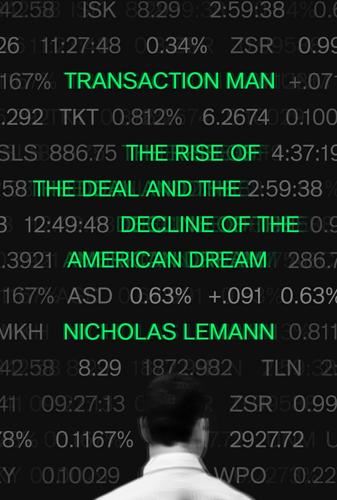
Transaction Man: The Rise of the Deal and the Decline of the American Dream
by
Nicholas Lemann
Published 9 Sep 2019
Their corporations operated extensive, university-style research laboratories, had unionized labor forces, and offered their white-collar employees job security and generous pensions as recompense for their loyalty. Nothing about this picture communicated vulnerability. * * * The financial economists did not write for a popular audience, but Milton Friedman often did. In 1970 he published an article in The New York Times Magazine, “The Social Responsibility of Business Is to Increase Its Profits.” Friedman was complaining about the most recent reappearance of the idea that corporations should do something to help solve the country’s larger problems—by reducing pollution, restraining price increases, or giving jobs to the needy unemployed, for example. To Friedman this represented a step along the road to socialism.
…
“describes a totally imaginary”: Adolf A. Berle, “Modern Functions of the Corporate System,” Columbia Law Review, Volume 62, Number 3 (March 1962), 438. “In fact, a large corporation”: Berle, “Modern Functions of the Corporate System,” 445. “an employee of the owners”: Milton Friedman, “The Social Responsibility of Business Is to Increase Its Profits,” New York Times Magazine, September 13, 1970. “Theory of the Firm”: Michael C. Jensen and William H. Meckling, “Theory of the Firm: Managerial Behavior, Agency Costs and Ownership Structure,” Journal of Financial Economics, Volume 3, Number 4 (October 1976), 305. “the physical appointments”: Jensen and Meckling, “Theory of the Firm,” 11 (this refers to the page number in a freestanding PDF version of the article, which can be found on the database Jensen founded, SSRN).
…
Casimir Six Degrees (program) six degrees, as term 60 Minutes Sloan, Alfred P. small businesses: liberal defense of; obsolescence of; as part of corporate ecosystem; see also auto dealers Smith, Adam Smith, Roger Snow Crash (Stephenson) social entrepreneurs socialism; regulation equated with; rejection of social movements SocialNet “Social Responsibility of Business Is to Increase Its Profits, The” (Friedman) Social Security Administration South Korea Southwest Catholic Cluster Project Southwest Organizing Project Soviet Union SpaceX Spark Networks Spencer, Herbert Sperling, Gene Spits, Gonneke Spitzer, Alan Spitzer, Alison Spitzer, Delbert (Del) Spitzer, George Spitzer, John Spitzer, Pat Standard Oil Stanford University; Hoffman at Stanley, Harold Star Citizen Start-Up of You, The (Hoffman) start-ups; buyouts of; see also specific companies State Department steel industry Stefanos, Leo Steffens, Lincoln Stein, Gertrude Stephenson, Neal Stevenson, Adlai stockholders, see shareholders stock market: 1929 crash of; statistical study of; see also investment banking; Jensen, Michael; Morgan Stanley; Securities and Exchange Commission shareholders; stocks stocks: bonds vs.; classes of in Silicon Valley; executives compensated in; new instruments outpacing; online sales of; on margin; see also stock market Story of a Lover, The (Hapgood) “Strength of Weak Ties, The” (Granovetter) Strickland, Ted strikes Strober, Sue Structure of Scientific Revolutions, The (Kuhn) Stuart, Harold subprime auto loans subprime mortgages, see mortgages Subud suburbs suffragists Summers, Lawrence Supreme Court; Brandeis on Sutton, Betty swaps, financial syndicate system; decline of Taft, William Howard Taft-Hartley bill Talman Federal Savings Tamayo Financial Services Tarbell, Ida TaskRabbit Teaching in the Home (Berle) Team Auto Tea Party technology, see computers; Internet; networks; Silicon Valley TED (conference) Temporary National Economic Committee Ten Step Sales Procedure (Spitzer) Tesla Thaler, Richard “Theory of the Firm” (Jensen and Meckling) Thiel, Peter; as provocateur Think and Grow Rich (Hill) Time-Life Tokyo Stock Exchange “too big to fail” doctrine totalitarianism Toyota trading: largest loss in; rise of; see also investment banking; Morgan Stanley Transaction Man; institutional model replaced by; loss of faith in; paradigm applied to social issues; pluralism and; see also financial economics; investment banking; Morgan Stanley Treasury Department; under Paulson; under Rubin passim; under Woodin Treaty of Detroit “Treaty of Detroit, The” (Bell) Troubled Asset Relief Program trucking Truman, David Truman, Harry Trump, Donald trustbusting; GM’s strategy against; of Morgan Stanley; obsolescence of; of tech firms Turner, Frederick Jackson Tversky, Amos 2008 financial crisis; automotive industry during; in Chicago Lawn; credit markets frozen during; government bailouts during; lead-up to, see deregulation; derivatives; mortgages Uber underwriting; by banks; decline of unions; criticism of; government support for; as interest groups; pensions from; Treaty of Detroit by United Auto Workers United Nations United States: core institutions of; corporations unforeseen by founders of; global influence of; national character in United States of America v.
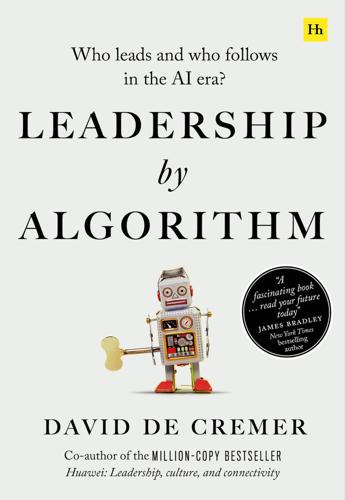
Leadership by Algorithm: Who Leads and Who Follows in the AI Era?
by
David de Cremer
Published 25 May 2020
In fact, in the summer of 2019, the Business Roundtable, led by JPMorgan Chase CEO Jamie Dimon and including leaders from some of America’s biggest companies, announced that decisions made by organizations should not only reflect the interests of shareholders, but of all stakeholders. With this statement, companies have now officially left behind the ideas developed by the famous economist Milton Friedman, who argued in his article, ‘The social responsibility of business is to increase its profits,’ that the sole purpose of an organization is to maximize profit for the shareholder.²⁰³ In a way, Friedman is saying that promoting shareholder value is the ethical thing to do! Today, we know better. Confronted with the possibility of becoming a more tech-driven and thus cool society, we increasingly feel that we need more, rather than less, humanity.
…
If technological revolutions lead to a shallow approach to humanity, innovations like care robots may ultimately lead to an increase in social isolation among humans. And that should not be an outcome that any human leader would wish to see happen. * * * 203 Friedman, M. (1970). ‘The social responsibility of business is to increase its profits.’ The New York Times Magazine, September 13. 204 De Cremer, D. (2018). ‘Why Mark Zuckerberg’s Leadership Failure was a Predictable Surprise.’ The European Business Review, May-June, 7-10. 205 Darwin, C. (2006). On the Origin of Species. Dover Publications Inc. 206 PwC (2018).
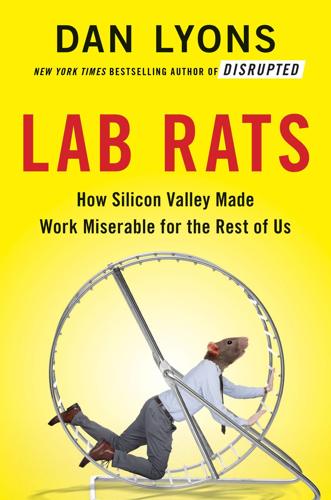
Lab Rats: How Silicon Valley Made Work Miserable for the Rest of Us
by
Dan Lyons
Published 22 Oct 2018
“People are pissed, and they have a right to be pissed.” How did companies get away with such an outrageous smash-and-grab looting of American workers? The story begins nearly a half century ago, in 1970, when the economist Milton Friedman published an essay in the New York Times magazine titled “The Social Responsibility of Business Is to Increase Its Profits.” That’s a pretty boring title. But few documents have inflicted so much harm on so many people. Milton Friedman Stole Your Pension Friedman was an economics professor at the University of Chicago and probably the most influential economist of the late twentieth century.
…
The Guardian, January 11, 2017. https://www.theguardian.com/business/2017/jan/11/inequality-world-economy-wef-brexit-donald-trump-world-economic-forum-risk-report. Felton, Ryan. “U.S. Labor Agency Files Amended Complaint Against Tesla for Alleged Worker Rights Violations.” Jalopnik, March 30, 2018. https://jalopnik.com/u-s-labor-agency-files-amended-complaint-against-tesla-1824214422. Friedman, Milton. “The Social Responsibility of Business Is to Increase Its Profits.” New York Times Magazine, September 13, 1970. Garfield, Leanna. “Amazon Just Visited New Jersey—and the State Is Offering a $7 Billion Incentive to Land HQ2.” Business Insider, April 13, 2018. http://www.businessinsider.com/amazon-headquarters-hq2-new-jersey-economic-incentive-2017-10.
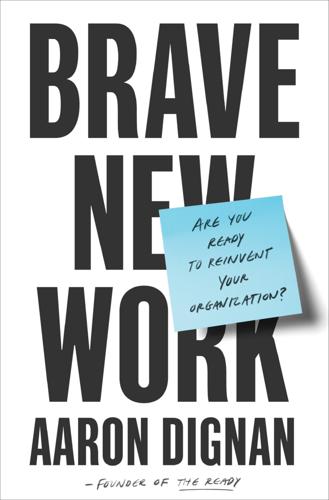
Brave New Work: Are You Ready to Reinvent Your Organization?
by
Aaron Dignan
Published 1 Feb 2019
It’s not your strategy or even your business model. It’s your Operating System. Get the OS right and your organization will run itself. PURPOSE How we orient and steer; the reason for being at the heart of any organization, team, or individual. In 1970 Milton Friedman famously said, “The social responsibility of business is to increase its profits.” To put it bluntly, the business of business is business. In the decades since, Legacy Organizations have internalized this to an astounding degree. As we’ve seen, this maxim has led corporations to optimize everything in society—the market, the law, even our attention—in order to drive short-term gain.
…
PART TWO: THE OPERATING SYSTEM human-centric design principles: Gary Hamel, “First, Let’s Fire All the Managers,” Harvard Business Review, December 2011, https://hbr.org/2011/12/first-lets-fire-all-the-managers. “business is to increase its profits”: Milton Friedman, “The Social Responsibility of Business Is to Increase Its Profits,” The New York Times Magazine, September 13, 1970, www.colorado.edu/studentgroups/libertarians/issues/friedman-soc-resp-business.html [inactive]. result of success is uninspiring: Scott Winship, “What Really Happened to Income Inequality in the 20th Century?” The Atlantic, May 14, 2012, www.theatlantic.com/business/archive/2012/05/what-really-happened-to-income-inequality-in-the-20th-century/257156.
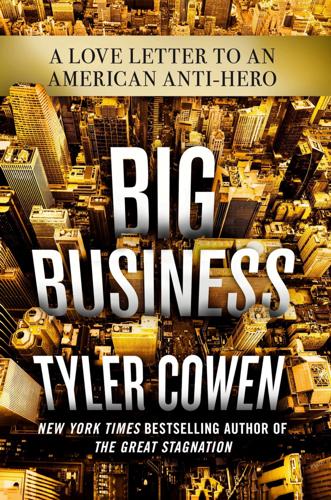
Big Business: A Love Letter to an American Anti-Hero
by
Tyler Cowen
Published 8 Apr 2019
Furthermore, the common portrait of corporations as consisting entirely of selfish or greedy individuals is not the best understanding of big business. Nobel laureate Milton Friedman, a major defender of capitalism and business, published a famous but ultimately misguided article in 1970 with the title “The Social Responsibility of Business Is to Increase Its Profits.” His main point was that business CEOs and managers are wrong to allocate shareholder resources for social justice or other altruistic goals. Friedman thought that ends other than profit could be valuable for society, but in his mind those ends were better pursued through charity, nonprofit institutions, or government policy, as corporations could not perform those tasks efficiently or in accordance with their basic natures.14 Although I am a fan of Milton Friedman and I share his skepticism about socialist solutions, I think this article reflected significant ideological blinders.
…
Centre for Economic Performance, London School of Economics and Political Science. Fried, Jesse M., and Charles C. Y. Wang. 2017. “Short-Termism and Shareholder Payouts: Getting Corporate Capital Flows Right.” Working Paper 17-062. Harvard Business School. Friedman, Milton. 1970. “The Social Responsibility of Business Is to Increase Its Profits.” New York Times Magazine, September 13, 1970. Friedman, Milton, John Mackey, and T. J. Rodgers. 2005. “Rethinking the Social Responsibility of Business.” Reason, October 2005. http://reason.com/archives/2005/10/01/rethinking-the-social-responsi. Frydman, Carola, and Dirk Jenter. 2010.
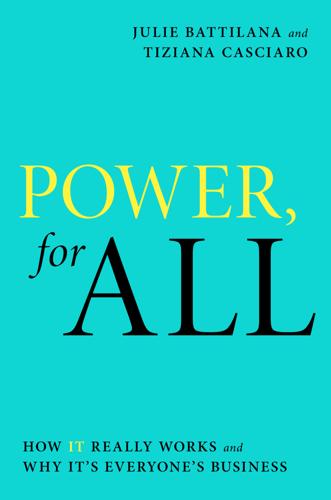
Power, for All: How It Really Works and Why It's Everyone's Business
by
Julie Battilana
and
Tiziana Casciaro
Published 30 Aug 2021
In the relentless pursuit of money, they are but one part of an economic system that places profit and consumption above everything else25—a system in which we are all complicit to some extent.26 We want the latest appliances, electronic devices, and fashions for as low a price as possible, while the companies that provide these goods and services want to make as much money as possible. In this neoliberal capitalist system espousing Milton Friedman’s thesis that “the social responsibility of business is to increase its profit,”27 financial short-termism has been so legitimized that it has become the norm in many modern societies. The logic of neoliberalism may have pushed the value we ascribe to money to an extreme, but wealth and material possessions have been highly prized and greatly desired throughout time.28 Read any of Jane Austen’s novels and you will find yourself evaluating a character’s marital prospects based on how much income and property they would bring to the marriage.
…
Climate Change Counter-Movement Organizations,” Climatic Change 122, no. 4 (2014): 681–94. 24 Amy Lieberman and Susanne Rust, “Big Oil Companies United to Fight Regulations, but Spent Millions Bracing for Climate Change,” Los Angeles Times, December 31, 2015, https://www.latimes.com/nation/la-na-oil-operations-20151231-story.html. 25 Noam Chomsky, Who Rules the World? (New York: Henry Holt, 2016). 26 George Marshall, Don’t Even Think About It: Why Our Brains Are Wired to Ignore Climate Change (New York: Bloomsbury, 2015). 27 Milton Friedman, “A Friedman Doctrine: The Social Responsibility of Business Is to Increase Its Profits,” New York Times, September 13, 1970, https://www.nytimes.com/1970/09/13/archives/a-friedman-doctrine-the-social-responsibility-of-business-is-to.html. 28 Thomas Piketty, Capital and Ideology, trans. Arthur Goldhammer (Cambridge, MA: Harvard University Press, 2020). 29 For a study of status-signaling consumption to boost self-esteem, see Niro Sivanathan and Nathan C.

WTF?: What's the Future and Why It's Up to Us
by
Tim O'Reilly
Published 9 Oct 2017
The Taft-Hartley Act of 1947 weakened the power of unions and allowed the passage of state laws that limited it still further. By 2012, only 12% of the US labor force was unionized, down from a peak above 30%. But, perhaps most important, a bad idea took hold. In September 1970, economist Milton Friedman penned an op-ed in the New York Times Magazine titled “The Social Responsibility of Business Is to Increase Its Profits,” which took ferocious aim at the idea that corporate executives had any obligation but to make money for their shareholders. “I hear businessmen speak eloquently about the ‘social responsibilities of business in a free-enterprise system,’” Friedman wrote. “The businessmen believe that they are defending free enterprise when they declaim that business is not concerned ‘merely’ with profit but also with promoting desirable ‘social’ ends; that business has a ‘social conscience’ and takes seriously its responsibilities for providing employment, eliminating discrimination, avoiding pollution and whatever else may be the catchwords of the contemporary crop of reformers.
…
Cryan, and Kirsten Tillisch, “Gut Microbes and the Brain: Paradigm Shift in Neuroscience,” Journal of Neuroscience, 34, no. 46 (2014): 15490–96, doi:10.1523/JNEU ROSCI.3299-14.2014. 235 “games of self-play”: David Silver et al., “Mastering the Game of Go with Deep Neural Networks and Tree Search,” Nature 529 (2016): 484–89, doi:10.1038/nature16961. 236 “previously encountered examples”: Beau Cronin, “Untapped Opportunities in AI,” O’Reilly Ideas, June 4, 2014, https://www.oreilly.com/ideas/untapped-opportunities-in-ai. 237 “that for a computer is plenty of time”: Michael Lewis interviewed by Terry Gross, “On a ‘Rigged’ Wall Street, Milliseconds Make All the Difference,” NPR Fresh Air, April 1, 2014, http://www.npr.org/2014/04/01/297686724/on-a-rigged-wall-street-milliseconds-make-all-the-difference. 238 “Creating things that you don’t understand is really not a good idea”: Felix Salmon, “John Thain Comes Clean,” Reuters, October 7, 2009, http://blogs. reuters.com/felix-salmon/2009/10/07/john-thain-comes-clean/. 238 credit far in excess of the underlying real assets: Gary Gorton, “Shadow Banking,” The Region (Federal Reserve Bank of Minneapolis), December 2010, retrieved April 2, 2017, http://faculty.som. yale.edu/garygorton/documents/Interview withTheRegionFRBofMinneapolis.pdf. 239 “an existential threat to capitalism”: Mark Blyth, “Global Trumpism,” Foreign Affairs, November 15, 2016, https://www.foreignaffairs.com/articles/2016-11-15/global-trumpism. 240 “pure and unadulterated socialism”: Milton Friedman, “The Social Responsibility of Business Is to Increase Its Profits,” New York Times Magazine, September 13, 1970, retrieved April 2, 2017, http://www.colorado.edu/studentgroups/liber tarians/issues/friedman-soc-resp-business.html. 241 benefit the business and its actual owners: Michael C. Jensen, and William H. Meckling, “Theory of the Firm: Managerial Behavior, Agency Costs and Ownership Structure,” Journal of Financial Economics 3, no. 4 (1976), http://dx.doi.org/10.2139/ssrn.94043. 241 sold or shuttered: Jack Welch, “Growing Fast in a Slow-Growth Economy,” Appendix A in Jack Welch and John Byrne, Jack: Straight from the Gut (New York: Warner Books, 2001). 242 “above which repurchases will be eschewed”: Warren Buffett, “Berkshire Hathaway Shareholder Letters: 2016,” Berkshire Hathaway, February 25, 2017, http://berkshirehathaway.com/letters/2016ltr.pdf. 243 “fulfill their responsibilities to their employees”: Larry Fink, “I write on behalf of our clients . . . ,” BlackRock, January 24, 2017, https://www.blackrock.com/corporate/en-us/investor-relations/larry-fink-ceo-letter. 243 growth of productivity in the US economy slowed substantially after 1970: Robert J.
…
See also financial markets Slaughter, Anne-Marie, 309 Sloan Management Review, MIT, 153 Sloss, Benjamin Treynor, 123 Smart Disclosure and smart contracts, 180 smartphones, xiii, 76, 128 Android operating system, 52 difficulty doing repairs, 338 iPhone, xiii, 32, 101, 128, 136 navigation/location tracking, 83–84 and sensors, 40, 41, 85 thick marketplace for, 133 Smith, Adam, 262 Smith, Jeff, 349 SNAP (Supplemental Nutrition Assistance Program), 140–42, 266 social capital, 345–50 social infrastructure AI as part of, 353–54 business intent to make money vs., 240–41 corporate control of media content vs., 226–28 fighting fake news with, 218–20 Ponzi scheme elements, 355–56 tools for building, 220–24 social media, 96–97, 207. See also individual platforms “Social Responsibility of Business Is to Increase Its Profits” (Friedman), 240 software, 15, 35 continuous improvement process, 30, 119–21, 122 and DevOps, 121–23 generative design, 327–28 MapReduce, 325 as organizational structure, 113–19 Perl, 10–11, 15, 16–17, 120–21 programmers as managers of, 153–54 RegTech, 175 for scheduling employees or ICs, 193 See also Microsoft; open source software “Software Above the Level of a Single Device” (O’Reilly), 31 solar energy, 326–27 Solomon, Jake, 141–43 Sony, 351 Soros, George, 210, 236 South by Southwest conference, 148–49 Southwest Airlines, 48–49 Spafford, George, 122 Spence, Michael, 67 sports and rewriting rules, 266–67 Spotify, 116 “Spy Who Fired Me, The” (Kaplan), 193 SRE (Site Reliability Engineer), 123, 146–47 Stallman, Richard, 6, 71, 72 stand-up meetings, 118 Stanton, Brandon, 370–71, 372 startups, 41, 186, 247, 275, 279, 282–85, 316 Steinberg, Tom, 146 Stern, Andy, 305 Sternberg, Seth, 332–33 “Stevey’s Platform Rent” (Yegge), 111–13 Stiglitz, Joseph, 255, 261, 266, 272–73 stock buybacks, 242–44, 245, 256 stock options, 247, 279–80 Stoppard, Tom, xii Stout, Lynn, 292 Strickler, Yancey, 292 Strine, Leo, 292 structural literacy, 343–44 success as a by-product, 353.
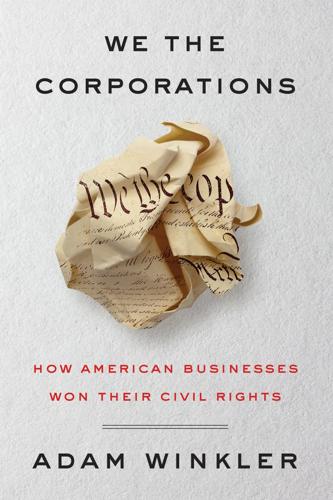
We the Corporations: How American Businesses Won Their Civil Rights
by
Adam Winkler
Published 27 Feb 2018
Ford Motor Company has become “an iconic statement that corporations have no obligations beyond the bottom line,” according to corporate law scholar Kent Greenfield. The economist Milton Friedman captured this view of the corporation in the title of a well-known article he wrote for the New York Times Magazine in 1970: “The Social Responsibility of Business Is to Increase Its Profits.” Of course corporations can take measures that also benefit other stakeholders, yet the majority view is that such activity must ultimately be in the long-term interests of the company and its stockholders. Genuine corporate social responsibility—done purely to serve employees, customers, or society, at the long-term expense of stockholders—would be a breach of management’s fiduciary duties.29 This principle of “shareholder wealth maximization” has become deeply engrained in America’s corporate culture.
…
Ford Motor Company, 170 N.W. 668 (Mich. 1919); Kent Greenfield, “Corporate Law’s Original Sin,” Washington Monthly (2015), available at http://washingtonmonthly.com/magazine/janfeb-2015/sidebar-corporate-laws-original-sin/. 27. Greenfield, “Corporate Law’s Original Sin.” 28. See Dodge v. Ford Motor Company, 170 N.W. 668 (Mich. 1919). 29. See Milton Friedman, “The Social Responsibility of Business Is to Increase Its Profits,” New York Times Magazine, September 13, 1970. 30. On the shareholder wealth maximization norm, see Stephen M. Bainbridge, “In Defense of the Shareholder Wealth Maximization Norm,” 50 Washington & Lee Law Review 1423 (1993). On its flaws, see Lynn Stout, The Shareholder Value Myth: How Putting Shareholders First Harms Investors, Corporations, and the Public (2012); Joel Bakan, The Corporation (2005). 31.
…
Southern Pacific Railroad, 144, 146, 151, 152–53, 156, 157, 159, 177–78, 180, 267, 401 Sarbanes-Oxley Act (2002), 383–84 Saturday Evening Post, 268 Saturday Press, 241–42 Savannah, Ga., 40–41 Scaife, Richard Mellon, 302 Scalia, Antonin, 127, 350, 352–53, 356, 362, 363, 366 school segregation, xxiv, 63–64, 135, 151, 231, 260, 263, 264, 272, 277–78, 281, 284, 340–41 searches and seizures, xvi, xxiv, 162, 164, 175, 176, 178, 185, 187–90, 359, 388, 401 Sea Venture, 10 Seconal, 299 Second Amendment, 20–21 “Section 56,” 209–10 securities fraud, 282 sedition, 238, 242, 250 Sedition Act (1918), 238, 242 segregation, racial, xxiv, 63–64, 125, 135, 151, 158, 221–22, 231, 257, 259, 260–64, 263, 265, 272–78, 281, 284, 340–41 self-incrimination, xvi, 162, 164, 178, 185, 187–88, 189, 310, 388 Selma, Ala., 257 Senate, Roman, 45 Senate, US, xiv, 94–95, 109, 114, 117, 121, 129, 196–97, 197, 283, 285–86, 300, 327 Senate Chamber, 117 “separate but equal” doctrine, 159, 185, 262–64, 340–41 Separate Car Act (1890), 160 “separation of ownership and control,” 270–71 Seventeenth Amendment, 129 sex discrimination, 314, 318, 322, 350, 358 Shakespeare, William, 10, 121 “shareholder wealth maximization” principle, 247–48 Sherman Antitrust Act (1890), 162, 171–72, 177, 179, 189, 202 Sherry’s Hotel, 194–95 Shiras, George, 182 Shreveport, La., 236 Shreveport Times, 234–35 Shunk, Francis Rawn, 91 Sidley Austin, 345, 346 Sikhs, 275–76 Sinclair, Upton, 280, 283 Sixteenth Street Baptist Church, 257 Sixth Amendment, 164 Slaughter-House Cases, 126–28, 132–34, 153, 154, 244 slaughterhouses, 126–28, 280 slavery, xiii, xiv, xxiii, 14, 17, 35, 58, 74, 108–10, 113, 125, 159, 164 Smalley, E. V., 117 Smith, Adam, 26 Smock, Harry, 166, 176 Smokey the Bear, 300 smoking, 279–80, 287–89, 295, 299, 321 smuggling, 26–27 snuff, 170 social conservatives, 348–49 social Darwinism, 140 socialism, xix, 214, 232, 233, 238, 285, 325, 343 “Social Responsibility of Business Is to Increase Its Profits, The,” (Friedman), 247–48 Social Security Administration, US, 377 social welfare organizations, 367–68 societas publicoranum, 44–45, 399 Solicitor General, US, 262, 340, 345, 354, 358 Sons of Liberty, 29–30 Sotomayor, Sonia, 358, 360, 363, 363, 366n Souter, David, 357, 358, 360, 363, 367, 368 South Carolina, 107, 124, 125 Southern Department Stores, 284 Southern Manifesto, 272 Southern Pacific Railroad, xii, xiii–xv, xxi, xxiii, 36, 111, 113–33, 116, 138, 140, 141, 142–48, 152–59, 160, 180, 286, 339, 392 South Sea Bubble (1720), 43 sovereignty, 24–25, 28, 43, 45, 48–49, 101, 133, 390–91 Spain, 7, 11, 45 special assessments, 330–32 special interests, 103–4, 123, 196–97, 223–26, 232, 281, 286, 302–4, 322, 371, 372, 375 speculation, financial, 26, 43 speech, freedom of, xvi, xx, 48, 164, 177, 192, 222–26, 228, 229, 234, 239, 238–44, 250, 268–72, 282, 291, 292–300, 309–10, 313–23, 354–55, 361, 367, 370, 393, 402 spousal abuse, 23–24 Stamp Act (1765), 28–29, 133 Standard Oil Co., xxi, 36, 141, 167, 168–69, 169, 170, 171–72, 189, 197, 201, 202, 207, 213, 234–35, 280, 382 Standard Oil of New Jersey, 168–69 Stanford, Leland, 119, 123, 140, 141, 142, 148 Starr, Kenneth, 346 “Star-Spangled Banner, The,” 59 “starving time,” 10 “state action” requirement, 267–68, 269 state banks, 38, 39, 93, 100 see also Bank of the United States, Second state bars, 244 state constitutions, 24–25, 177 state courts, 41–42, 44, 53, 64, 78–79, 104–6, 107, 258–59 State Department, US, 93 state elections, 197–98, 332 state licensing authorities, 290–300 State of the Union address (1905), 217 State of the Union address (2010), 370–72 states’ rights, xvii, xviii, 40, 43, 88, 92, 97–103, 164, 218, 272, 275–76, 298, 316 state taxes, 90, 99, 100, 305–23 Statue of Liberty, 292 Stephens, William, 53, 55 Stevens, John Paul, 313, 336, 358, 363, 363, 366–70, 380 Stewart, Malcolm, 354–55 Stewart, Potter, 313 Stites, Francis, 76 stock certificates, 123, 155, 197 stock market, 26, 56, 106, 122, 123, 198, 235, 248, 344, 384–88 stock market crash (1929), 198, 235 Stone, Harlan Fiske, 231–34, 233, 238, 251, 252, 256, 264, 269, 276–77, 278 Stone, John W., 224 Story, Joseph, 53, 75–76, 79, 81–82, 85, 88, 222 “Story of a Great Monopoly, The,” (Lloyd), 171–72 Strine, Leo, 382–89, 384 Students for a Democratic Society (SDS), 349 submarines, 292–93 subpoenas, 161, 174–75, 185, 187 subprime mortgage derivatives, 359–60 Sugar Trust, 197 Sullivan, J.
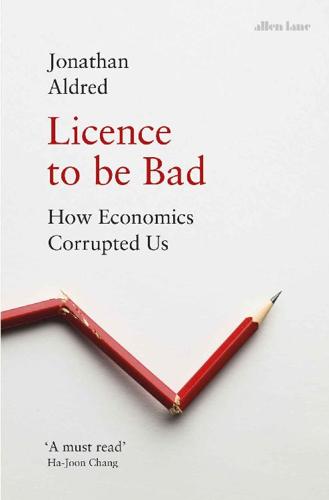
Licence to be Bad
by
Jonathan Aldred
Published 5 Jun 2019
At least part of the answer must surely reflect the change in corporate culture encouraged by a Chicago economist named Milton Friedman. In 1970 Friedman – who would later advise US President Ronald Reagan and Prime Minister Margaret Thatcher in the UK – wrote a landmark article in The New York Times entitled ‘The Social Responsibility of Business is to Increase Its Profits’. In case of doubt, Friedman explained that profit was the only responsibility of business. The influence of recent economic ideas has not been limited to the corporate and financial worlds. At around the same time that Friedman reframed the responsibilities of business, new ideas were reframing the responsibilities of individuals too.
…
objection, 107, 119–20 Friedman, Milton, 4–5, 56, 69, 84, 88, 126, 189 awarded Nobel Prize, 132 and business responsibility, 2, 152 debate with Coase at Director’s house, 50, 132 as dominant Chicago thinker, 50, 132 on fairness and justice, 60 flawed arguments of, 132–3 influence on modern economics, 131–2 and monetarism, 87, 132, 232 at Mont Pèlerin, 5, 132 rejects need for realistic assumptions, 132–3 Sheraton Hall address (December 1967), 132 ‘The Methodology of Positive Economics’ (essay, 1953), 132–3 ‘The Social Responsibility of Business is to Increase Its Profits’ (article, 1970), 2, 152 Frost, Gerald, Antony Fisher: Champion of Liberty (2002), 7* Galbraith, John Kenneth, 242–3 game theory assumptions of ‘rational behaviour’, 18, 28, 29–32, 35–8, 41–3, 70, 124 Axelrod’s law of the instrument, 41 backward induction procedure, 36–7, 38 and Cold War nuclear strategy, 18, 20, 21–2, 24, 27, 33–4, 35, 70, 73, 198 focus on consequences alone, 43 as form of zombie science, 41 and human awareness, 21–3, 24–32 and interdependence, 23 limitations of, 32, 33–4, 37–40, 41–3 minimax solution, 22 multiplicity problem, 33–4, 35–7, 38 Nash equilibrium, 22–3, 24, 25, 27–8, 33–4, 41–2 the Nash program, 25 and nature of trust, 28–31, 41 the Prisoner’s Dilemma, 26–8, 29–32, 42–3 real world as problem for, 21–2, 24–5, 29, 31–2, 37–8, 39–40, 41–3 rise of in economics, 40–41 and Russell’s Chicken, 33–4 and Schelling, 138–9 and spectrum auctions, 39–40 theory of repeated games, 29–30, 35 tit-for-tat, 30–31 and trust, 29, 30–31, 32, 41 uses of, 23–4, 34, 38–9 view of humanity as non-cooperative/distrustful, 18, 21–2, 25–32, 36–8, 41–3 Von Neumann as father of, 18, 19, 20–22, 25, 26, 28, 30, 34, 41 zero-sum games, 21–2 Gates, Bill, 221–2 Geithner, Tim, 105 gender, 127–8, 130–31, 133, 156 General Electric, 159 General Motors (GM), 215–16 George, Prince of Cambridge, 98 Glass–Steagall Act, repeal of, 194 globalization, 215, 220 Goldman Sachs, 182, 184, 192 Google, 105 Gore, Al, 39 Great Reform Act (1832), 120 greed, 1–2, 196, 197, 204, 229, 238 Greenspan, Alan, 57, 203 Gruber, Jonathan, 245 Haifa, Israel, 158, 161 Harper, ‘Baldy’, 7 Harsanyi, John, 34–5, 40 Harvard Business Review, 153 Hayek, Friedrich and Arrow’s framework, 78–9 economics as all of life, 8 and Antony Fisher, 6–7 influence on Thatcher, 6, 7 and Keynesian economics, 5–6 and legal frameworks, 7* at LSE, 4 at Mont Pèlerin, 4, 5, 6, 15 and Olson’s analysis, 104 and public choice theory, 89 rejection of incentive schemes, 156 ‘spontaneous order’ idea, 30 The Road to Serfdom (1944), 4, 5, 6, 78–9, 94 healthcare, 91–2, 93, 178, 230, 236 hedge funds, 201, 219, 243–4 Heilbroner, Robert, The Worldly Philosophers, 252 Heller, Joseph, Catch-22, 98, 107, 243–4 Helmsley, Leona, 105 hero myths, 221–3, 224 Hewlett-Packard, 159 hippie countercultural, 100 Hoffman, Abbie, Steal This Book, 100 Holmström, Bengt, 229–30 homo economicus, 9, 10, 12, 140, 156–7 and Gary Becker, 126, 129, 133, 136 and behaviour of real people, 15, 136, 144–5, 171, 172, 173, 250–51 and behavioural economics, 170, 171, 172, 255 long shadow cast by, 248 and Nudge economists, 13, 172, 173, 174–5, 177 Hooke, Robert, 223 housing market, 128–9, 196, 240–41 separate doors for poor people, 243 Hume, David, 111 Huxley, Thomas, 114 IBM, 181, 222 identity, 32, 165–6, 168, 180 Illinois, state of, 46–7 immigration, 125, 146 Impossibility Theorem, 72, 73–4, 75, 89, 97 Arrow’s assumptions, 80, 81, 82 and Duncan Black, 77–8 and free marketeers, 78–9, 82 as misunderstood and misrepresented, 76–7, 79–82 ‘paradox of voting’, 75–7 as readily solved, 76–7, 79–80 Sen’s mathematical framework, 80–81 incentives adverse effect on autonomy, 164, 165–6, 168, 169–70, 180 authority figure–autonomy contradiction, 180 and behavioural economics, 171, 175, 176–7 cash and non-cash gifts, 161–2 context and culture, 175–6 contrast with rewards and punishments, 176–7 ‘crowding in’, 176 crowding out of prior motives, 160–61, 162–3, 164, 165–6, 171, 176 impact of economists’ ideas, 156–7, 178–80 and intrinsic motivations, 158–60, 161–3, 164, 165–6, 176 and moral disengagement, 162, 163, 164, 166 morally wrong/corrupting, 168–9 origins in behaviourism, 154 and orthodox theory of motivation, 157–8, 164, 166–7, 168–70, 178–9 payments to blood donors, 162–3, 164, 169, 176 as pervasive in modern era, 155–6 respectful use of, 175, 177–8 successful, 159–60 as tools of control/power, 155–7, 158–60, 161, 164, 167, 178 Indecent Proposal (film, 1993), 168 India, 123, 175 individualism, 82, 117 and Becker, 134, 135–8 see also freedom, individual Industrial Revolution, 223 inequality and access to lifeboats, 150–51 and climate change, 207–9 correlation with low social mobility, 227–8, 243 and demand for positional goods, 239–41 and economic imperialism, 145–7, 148, 151, 207 and efficiency wages, 237–8 entrenched self-deluding justifications for, 242–3 and executive pay, 215–16, 219, 224, 228–30, 234, 238 as falling in 1940–80 period, 215, 216 Great Gatsby Curve, 227–8, 243 hero myths, 221–3, 224 increases in as self-perpetuating, 227–8, 230–31, 243 as increasing since 1970s, 2–3, 215–16, 220–21 and lower growth levels, 239 mainstream political consensus on, 216, 217, 218, 219–21 marginal productivity theory, 223–4, 228 new doctrine on taxation since 1970s, 232–5 and Pareto, 217, 218–19, 220 poverty as waste of productive capacity, 238–9 public attitudes to, 221, 226–8 rises in as not inevitable, 220, 221, 242 role of luck downplayed, 222, 224–6, 243 scale-invariant nature of, 219, 220 ‘socialism for the rich’, 230 Thatcher’s praise of, 216 and top-rate tax cuts, 231, 233–5, 239 trickle-down economics, 232–3 US and European attitudes to, 226–7 ‘you deserve what you get’ belief, 223–6, 227–8, 236, 243 innovation, 222–3, 242 Inside Job (documentary, 2010), 88 Institute of Economic Affairs, 7–8, 15, 162–3 intellectual property law, 57, 68, 236 Ishiguro, Kazuo, Never Let Me Go, 148 Jensen, Michael, 229 Journal of Law and Economics, 49 justice, 1, 55, 57–62, 125, 137 Kahn, Herman, 18, 33 Kahneman, Daniel, 170–72, 173, 179, 202–3, 212, 226 Kennedy, President John, 139–40 Keynes, John Maynard, 11, 21, 162, 186, 204 and Buchanan’s ideology, 87 dentistry comparison, 258–9, 261 on economics as moral science, 252–3 Friedman’s challenge to orthodoxy of, 132 Hayek’s view of, 5–6 massive influence of, 3–4, 5–6 on power of economic ideas, 15 and probability, 185, 186–7, 188–9, 190, 210 vision of the ideal economist, 20 General Theory (1936), 15, 188–9 Khomeini, Ayatollah, 128 Khrushchev, Nikita, 139–40, 181 Kilburn Grammar School, 48 Kildall, Gary, 222 Kissinger, Henry, 184 Knight, Frank, 185–6, 212 Krugman, Paul, 248 Kubrick, Stanley, 35*, 139 labour child labour, 124, 146 and efficiency wages, 237–8 labour-intensive services, 90, 92–3 lumpenproletariat, 237 Olson’s hostility to unions, 104 Adam Smith’s ‘division of labour’ concept, 128 Laffer, Arthur, 232–3, 234 Lancet (medical journal), 257 Larkin, Philip, 67 law and economics movement, 40, 55, 56–63, 64–7 Lazear, Edward, ‘Economic Imperialism’, 246 legal system, 7* and blame for accidents, 55, 60–61 and Chicago School, 49, 50–52, 55 and Coase Theorem, 47, 49, 50–55, 63–6 criminal responsibility, 111, 137, 152 economic imperialist view of, 137 law and economics movement, 40, 55, 56–63, 64–7 ‘mimic the market’ approach, 61–3, 65 Posner’s wealth-maximization principle, 57–63, 64–7, 137 precautionary principle, 211–12, 214 transaction costs, 51–3, 54–5, 61, 62, 63–4, 68 Lehmann Brothers, 194 Lexecon, 58, 68 Linda Problem, 202–3 LineStanding.com, 123 Little Zheng, 123, 124 Lloyd Webber, Andrew, 234–5, 236 lobbying, 7, 8, 88, 115, 123, 125, 146, 230, 231, 238 loft-insulation schemes, 172–3 logic, mathematical, 74–5 The Logic of Life (Tim Harford, 2008), 130 London School of Economics (LSE), 4, 48 Long-Term Capital Management (LTCM), 201, 257 Machiavelli, Niccoló, 89, 94 Mafia, 30 malaria treatments, 125, 149 management science, 153–4, 155 Mandelbrot, Benoît, 195, 196, 201 Mankiw, Greg, 11 marginal productivity theory, 223–4 Markowitz, Harry, 196–7, 201, 213 Marx, Karl, 11, 101, 102, 104, 111, 223 lumpenproletariat, 237 mathematics, 9–10, 17–18, 19, 21–4, 26, 247, 248, 255, 259 of 2007 financial crash, 194, 195–6 and Ken Arrow, 71, 72, 73–5, 76–7, 82–3, 97 axioms (abstract assumptions), 198 fractals (scale-invariance), 194, 195–6, 201, 219 and orthodox decision theory, 190–91, 214 Ramsey Rule on discounting, 208–9, 212 and Savage, 189–90, 193, 197, 198, 199, 205 and Schelling, 139 Sen’s framework on voting systems, 80–81 standard deviation, 182, 192, 194 and stock market statistics, 190–91, 195–6 use of for military ends, 71–2 maximizing behaviour and Becker, 129–31, 133–4, 147 and catastrophe, 211 and Coase, 47, 55, 59, 61, 63–9 economic imperialism, 124–5, 129–31, 133–4, 147, 148–9 Posner’s wealth-maximization principle, 57–63, 64–7, 137 profit-maximizing firms, 228 see also wealth-maximization principle; welfare maximization McCluskey, Kirsty, 194 McNamara, Robert, 138 median voter theorem, 77, 95–6 Merton, Robert, 201 Meucci, Antonio, 222 microeconomics, 9, 232, 259 Microsoft, 222 Miles, David, 258 Mill, John Stuart, 102, 111, 243 minimum wage, national, 96 mobility, economic and social correlation with inequality, 226–8, 243 as low in UK, 227 as low in USA, 226–7 US–Europe comparisons, 226–7 Modern Times (Chaplin film, 1936), 154 modernism, 67 Moivre, Abraham de, 193 monetarism, 87, 89, 132, 232 monopolies and cartels, 101, 102, 103–4 public sector, 48–9, 50–51, 93–4 Mont Pèlerin Society, 3–9, 13, 15, 132 Morgenstern, Oskar, 20–22, 24–5, 28, 35, 124, 129, 189, 190 Mozart, Wolfgang Amadeus, 91, 92–3 Murphy, Kevin, 229 Mussolini, Benito, 216, 219 Nash equilibrium, 22–3, 24, 25, 27–8, 33–4, 41–2 Nash, John, 17–18, 22–3, 24, 25–6, 27–8, 33–4, 41–2 awarded Nobel Prize, 34–5, 38, 39, 40 mental health problems, 25, 26, 34 National Health Service, 106, 162 ‘neoliberalism’, avoidance of term, 3* Neumann, John von ambition to make economics a science, 20–21, 24–5, 26, 35, 125, 151, 189 as Cold War warrior, 20, 26, 138 and expansion of scope of economics, 124–5 as father of game theory, 18, 19, 20–22, 25, 26, 28, 30, 34, 41 final illness and death of, 19, 34, 35, 43–4 genius of, 19–20 as inspiration for Dr Strangelove, 19 and Nash’s equilibrium, 22–3, 25, 38* simplistic view of humanity, 28 theory of decision-making, 189, 190, 203 neuroscience, 14 New Deal, US, 4, 194, 231 Newton, Isaac, 223 Newtonian mechanics, 21, 24–5 Nixon, Richard, 56, 184, 200 NORAD, Colorado Springs, 181 nuclear weapons, 18–19, 20, 22, 27, 181 and Ellsberg, 200 and game theory, 18, 20, 21–2, 24, 27, 33–4, 35, 70, 73, 198 MAD (Mutually Assured Destruction), 35, 138 and Russell’s Chicken, 33–4 and Schelling, 138, 139 Nudge economists, 13, 171–5, 177–8, 179, 180, 251 Oaten, Mark, 121 Obama, Barack, 110, 121, 157, 172, 180 Olson, Mancur, 103, 108, 109, 119–20, 122 The Logic of Collective Action (1965), 103–4 On the Waterfront (Kazan film, 1954), 165 online invisibility, 100* organs, human, trade in, 65, 123, 124, 145, 147–8 Orwell, George, Nineteen Eighty-Four, 42–3 Osborne, George, 233–4 Packard, David, 159 Paine, Tom, 243 Pareto, Vilfredo 80/20 rule’ 218 and inequality, 217, 218–19, 220 life and background of, 216–17 Pareto efficiency, 217–18, 256* Paul the octopus (World Cup predictor, 2010), 133 pensions, workplace, 172, 174 physics envy, 9, 20–21, 41, 116, 175–6, 212, 247 Piketty, Thomas, 234, 235 plastic shopping bag tax, 159–60 Plato’s Republic, 100–101, 122 political scientists and Duncan Black, 78, 95–6 Black’s median voter theorem, 95–6 Buchanan’s ideology, 84–5 crises of the 1970s, 85–6 influence of Arrow, 72, 81–2, 83 see also public choice theory; social choice theory Posner, Richard, 54, 56–63, 137 ‘mimic the market’ approach, 61–3, 65 ‘The Economics of the Baby Shortage’ (1978), 61 precautionary principle, 211–12, 214 price-fixing, 101, 102, 103–4 Princeton University, 17, 19–20 Prisoner’s Dilemma, 26–8, 29–32, 42–3 prisons, cell upgrades in, 123 privatization, 50, 54, 88, 93–4 probability, 182–4 and Keynes, 185, 186–7, 188–9, 210 Linda Problem, 202–3 modern ideas of, 184–5 Ramsey’s personal probabilities (beliefs as probabilities), 187–8, 190, 197, 198, 199, 204–5 and Savage, 190, 193, 197, 198, 199, 203, 205 ‘Truth and Probability’ (Ramsey paper), 186–8, 189, 190 see also risk and uncertainty Proceedings of the National Academy of Sciences, 22 productivity Baumol’s cost disease, 90–92, 93, 94 and efficiency wages, 237–8 improvement in labour-intensive services, 92–3 labour input, 92 protectionism, 246, 255 psychology availability heuristic, 226 behaviourism, 154–8, 237 and behavioural economics, 12, 170–71 cognitive dissonance, 113–14 and financial incentives, 156–7, 158–60, 163–4, 171 framing effects, 170–71, 259 of free-riding, 113–14, 115 intrinsic motivations, 158–60, 161–3, 164, 165–6, 176 irrational behaviour, 12, 15, 171 learning of social behaviour, 163–4 moral disengagement, 162, 163, 164, 166 motivated beliefs, 227 ‘self-command’ strategies, 140 view of in game theory, 26–31 view of in public choice theory, 85–6 and welfare maximization, 149 ‘you deserve what you get’ belief, 223–6, 227–8, 236, 243 public choice theory as consensus view, 84–5 and crises of the 1970s, 85–6 foolish voter assumption, 86–8 ‘paradox of voter turnout’, 88–9, 95–6, 115–16 partial/self-contradictory application of, 86, 87–9 ‘political overload’ argument, 85, 86–7 ‘public bad, private good’ mantra, 93–4, 97 and resistance to tax rises, 94, 241 self-fulfilling prophecies, 95–7 and selfishness, 85–6, 87–8, 89, 94, 95–7 as time-bomb waiting to explode, 85 public expenditure in 1970s and ’80s, 89 Baumol’s cost disease, 90–92, 93, 94 and Keynesian economics, 4 and public choice theory, 85–8, 89, 241 and tax rises, 241–2 public-sector monopolies, 48–9, 50–51, 93–4 Puzzle of the Harmless Torturers, 118–19 queue-jumping, 123, 124 QWERTY layout, 42 racial discrimination, 126–7, 133, 136, 140 Ramsey, Frank, 186–8, 189, 190, 205, 208 Ramsey Rule, 208–9, 212 RAND Corporation, 17, 41, 103, 138, 139 and Ken Arrow, 70–71, 72–3, 74, 75–6, 77, 78 and behaviourism, 154 and Cold War military strategy, 18, 20, 21–2, 24, 27, 33–4, 70, 73, 75–6, 141, 200, 213 and Ellsberg, 182–4, 187, 197–8, 200 and Russell’s Chicken, 33 Santa Monica offices of, 18 self-image as defender of freedom, 78 rational behaviour assumptions in game theory, 18, 28, 29–32, 35–8, 41–3, 70, 124 axioms (abstract mathematical assumptions), 198 Becker’s version of, 128–9, 135, 140, 151 behavioural economics/Nudge view of, 173, 174–5 distinction between values and tastes, 136–8 economic imperialist view of, 135, 136–8, 140, 151 and free-riding theory, 100–101, 102, 103–4, 107–8, 109–10, 115–16 and orthodox decision theory, 198, 199 public choice theory relates selfishness to, 86 term as scientific-sounding cover, 12 see also homo economicus Reader’s Digest, 5, 6 Reagan, Ronald, 2, 87–8, 89, 104, 132 election of as turning point, 6, 216, 220–21 and top-rate tax cuts, 231, 233 regulators, 1–2 Chicago view of, 40 Reinhart, Carmen, 258 religion, decline of in modern societies, 15, 185 renewable energy, 116 rent-seeking, 230, 238 ‘right to recline’, 63–4 risk and uncertainty bell curve distribution, 191–4, 195, 196–7, 201, 203–4, 257 catastrophes, 181–2, 191, 192, 201, 203–4, 211–12 delusions of quantitative ‘risk management’, 196, 213 Ellsberg’s experiment (1961), 182–4, 187, 197, 198–200 errors in conventional thinking about, 191–2, 193–4, 195–7, 204–5, 213 financial orthodoxy on risk, 196–7, 201–2 and First World War, 185 and fractals (scale-invariance), 194, 195–6, 201 hasard and fortuit, 185* ‘making sense’ of through stories, 202–3 ‘measurable’ and ‘unmeasurable’ distinction, 185–6, 187–9, 190, 210–11, 212–13 measurement in numerical terms, 181–4, 187, 189, 190–94, 196–7, 201–2, 203–5, 212–13 orthodox decision theory, 183–4, 185–6, 189–91, 193–4, 201–2, 203–5, 211, 212–14 our contemporary orthodoxy, 189–91 personal probabilities (beliefs as probabilities), 187–8, 190, 197, 198, 199, 204–5 precautionary principle, 211–12, 214 pure uncertainty, 182–3, 185–6, 187–9, 190, 197, 198–9, 210, 211, 212, 214, 251 redefined as ‘volatility’, 197, 213 the Savage orthodoxy, 190–91, 197, 198–200, 203, 205 scenario planning as crucial, 251 Taleb’s black swans, 192, 194, 201, 203–4 ‘Truth and Probability’ (Ramsey paper), 186–8, 189, 190 urge to actuarial alchemy, 190–91, 197, 201 value of human life (‘statistical lives’), 141–5, 207 see also probability Robertson, Dennis, 13–14 Robinson, Joan, 260 Rodrik, Dani, 255, 260–61 Rogoff, Ken, 258 Rothko, Mark, 4–5 Rumsfeld, Donald, 232–3 Russell, Bertrand, 33–4, 74, 97, 186, 188 Ryanair, 106 Sachs, Jeffrey, 257 Santa Monica, California, 18 Sargent, Tom, 257–8 Savage, Leonard ‘Jimmie’, 189–90, 193, 203, 205scale-invariance, 194, 195–6, 201, 219 Scandinavian countries, 103, 149 Schelling, Thomas, 35* on access to lifeboats, 150–51 awarded Nobel Prize, 138–9 and Cold War nuclear strategy, 138, 139–40 and economic imperialism, 141–5 and game theory, 138–9 and Washington–Moscow hotline, 139–40 work on value of human life, 141–5, 207 ‘The Intimate Contest for Self-command’ (essay, 1980), 140, 145 ‘The Life You Save May be Your Own’ (essay, 1968), 142–5, 207 Schiphol Airport, Amsterdam, 172 Schmidt, Eric, 105 Scholes, Myron, 201 Schwarzman, Stephen, 235 Second World War, 3, 189, 210 selfishness, 41–3, 178–9 and Becker, 129–30 and defence of inequality, 242–3 as free marketeers’ starting point, 10–12, 13–14, 41, 86, 178–9 and game theory, 18 and public choice theory, 85–6, 87–8, 89, 94, 95–7 Selten, Reinhard, 34–5, 36, 38, 40 Sen, Amartya, 29, 80–81 service sector, 90–93, 94 Shakespeare, William, Measure for Measure, 169 Shaw, George Bernard, 101 Shiller, Robert, 247 Simon, Herbert, 223 Skinner, Burrhus, 154–5, 158 Smith, Adam, 101, 111, 122 The Wealth of Nations (1776), 10–11, 188–9 snowflakes, 195 social choice theory, 72 and Ken Arrow, 71–83, 89, 95, 97, 124–5, 129 and Duncan Black, 78, 95 and free marketeers, 79, 82 Sen’s mathematical framework, 80–81 social media, 100* solar panels, 116 Solow, Bob, 163, 223 Sorites paradox, 117–18, 119 sovereign fantasy, 116–17 Soviet Union, 20, 22, 70, 73, 82, 101, 104, 167, 237 spectrum auctions, 39–40, 47, 49 Stalin, Joseph, 70, 73, 101 the state anti-government attitudes in USA, 83–5 antitrust regulation, 56–8 dismissal of almost any role for, 94, 135, 235–6, 241 duty over full employment, 5 economic imperialist arguments for ‘small government’, 135 increased economic role from 1940s, 3–4, 5 interventions over ‘inefficient’ outcomes, 53 and monetarism, 87, 89 and Mont Pèlerin Society, 3, 4, 5 and privatization, 50, 54, 88, 93–4 public-sector monopolies, 48–50, 93–4 replacing of with markets, 79 vital role of, 236 statistical lives, 141–5, 207 Stern, Nick, 206, 209–10 Stigler, George, 50, 51, 56, 69, 88 De Gustibus Non Est Disputandum (with Becker, 1977), 135–6 Stiglitz, Joseph, 237 stock markets ‘Black Monday’ (1987), 192 and fractals (scale-invariance), 194, 195–6, 201 orthodox decision theory, 190–91, 193–4, 201 Strittmatter, Father, 43–4 Summers, Larry, 10, 14 Sunstein, Cass, 173 Nudge (with Richard Thaler, 2008), 171–2, 175 Taleb, Nassim, 192 Tarski, Alfred, 74–5 taxation and Baumol’s cost disease, 94 and demand for positional goods, 239–41 as good thing, 231, 241–2, 243 Laffer curve, 232–3, 234 new doctrine of since 1970s, 232–4 property rights as interdependent with, 235–6 public resistance to tax rises, 94, 239, 241–2 and public spending, 241–2 revenue-maximizing top tax rate, 233–4, 235 tax avoidance and evasion, 99, 105–6, 112–13, 175, 215 ‘tax revolt’ campaigns (1970s USA), 87 ‘tax as theft’ culture, 235–6 top-rate cuts and inequality, 231, 233–5, 239 whines from the super-rich, 234–5, 243 Taylor, Frederick Winslow, 153–4, 155, 167, 178, 237 Thaler, Richard, 13 Nudge (with Cass Sunstein, 2008), 171–2, 175 Thatcher, Margaret, 2, 88, 89, 104, 132 election of as turning point, 6, 216, 220–21 and Hayek, 6, 7 and inequality, 216, 227 privatization programme, 93–4 and top-rate tax cuts, 231 Theory of Games and Economic Behavior (Von Neumann and Morgenstern, 1944), 20, 21, 25, 189 Titanic, sinking of (1912), 150 Titmuss, Richard, The Gift Relationship, 162–3 tobacco-industry lobbyists, 8 totalitarian regimes, 4, 82, 167–8, 216, 219 see also Soviet Union trade union movement, 104 Tragedy of the Commons, 27 Truman, Harry, 20, 237 Trump, Donald, 233 Tucker, Albert, 26–7 Tversky, Amos, 170–72, 173, 202–3, 212, 226 Twitter, 100* Uber, 257 uncertainty see risk and uncertainty The Undercover Economist (Tim Harford, 2005), 130 unemployment and Coase Theorem, 45–7, 64 during Great Depression, 3–4 and Keynesian economics, 4, 5 United Nations, 96 universities auctioning of places, 124, 149–50 incentivization as pervasive, 156 Vietnam War, 56, 198, 200, 249 Villari, Pasquale, 30 Vinci, Leonardo da, 186 Viniar, David, 182, 192 Volkswagen scandal (2016), 2, 151–2 Vonnegut, Kurt, 243–4 voting systems, 72–4, 77, 80, 97 Arrow’s ‘Independence of Irrelevant Alternatives’, 81, 82 Arrow’s ‘Universal Domain’, 81, 82 and free marketeers, 79 ‘hanging chads’ in Florida (2000), 121 recount process in UK, 121 Sen’s mathematical framework, 80–81 Waldfogel, Joel, 161* Wanniski, Jude, 232 Watertown Arsenal, Massachusetts, 153–4 Watson Jr, Thomas J., 181 wealth-maximization principle, 57–63 and Coase, 47, 55, 59, 63–9 as core principle of current economics, 253 created markets, 65–7 extension of scope of, 124–5 and justice, 55, 57–62, 137 and knee space on planes, 63–4 practical problems with negotiations, 62–3 and values more important than efficiency, 64–5, 66–7 welfare maximization, 124–5, 129–31, 133–4, 148–9, 176 behavioural economics/Nudge view of, 173 and vulnerable/powerless people, 146–7, 150 welfare state, 4, 162 Wilson, Charlie, 215 Wittgenstein, Ludwig, 186, 188 Wolfenschiessen (Swiss village), 158, 166–7 Woolf, Virginia, 67 World Bank, 96 World Cup football tournament (2010), 133 World Health Organization, 207 Yale Saturday Evening Pest, 4–5 Yellen, Janet, 237 THE BEGINNING Let the conversation begin … Follow the Penguin twitter.com/penguinukbooks Keep up-to-date with all our stories youtube.com/penguinbooks Pin ‘Penguin Books’ to your pinterest.com/penguinukbooks Like ‘Penguin Books’ on facebook.com/penguinbooks Listen to Penguin at soundcloud.com/penguin-books Find out more about the author and discover more stories like this at penguin.co.uk ALLEN LANE UK | USA | Canada | Ireland | Australia India | New Zealand | South Africa Allen Lane is part of the Penguin Random House group of companies whose addresses can be found at global.penguinrandomhouse.com First published 2019 Copyright © Jonathan Aldred, 2019 The moral right of the author has been asserted Jacket photograph © Getty Images ISBN: 978-0-241-32544-5 This ebook is copyright material and must not be copied, reproduced, transferred, distributed, leased, licensed or publicly performed or used in any way except as specifically permitted in writing by the publishers, as allowed under the terms and conditions under which it was purchased or as strictly permitted by applicable copyright law.
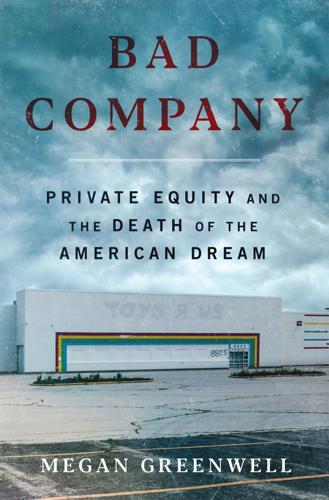
Bad Company
by
Megan Greenwell
Published 18 Apr 2025
Milton Friedman had outlined his objections to managerialism in his 1962 book Capitalism and Freedom, but it was his New York Times essay eight years later that popularized his “shareholder theory,” revolutionized MBA curricula across the country, and set the stage for the rise of private equity. “The social responsibility of business is to increase its profits,” the headline announced; the three thousand words that followed warned that any corporate executive who concerned himself with any factors other than making his business more profitable—including “providing employment, eliminating discrimination, avoiding pollution and whatever else may be the catchwords of the contemporary crop of reformers”—was a socialist with no place in American capitalism.
…
Apollo Global Management cofounder: Matthew Goldstein, “Senate Committee Presses Leon Black on Epstein Tax Advice,” New York Times, July 25, 2023, https://www.nytimes.com/2023/07/25/business/leon-black-jeffrey-epstein-senate.html. Dozens of people: Maryann Feldman and Martin Kenney, Private Equity and the Demise of the Local (Cambridge: Cambridge University Press, 2024), 26. The sole interest: Milton Friedman, “A Friedman Doctrine—The Social Responsibility of Business Is to Increase Its Profits,” New York Times, September 13, 1970, https://www.nytimes.com/1970/09/13/archives/a-friedman-doctrine-the-social-responsibility-of-business-is-to.html. Between 2013 and 2023: Yang Liu and Lue Xiong, “Leverage in Private Equity: What Do We Know?” MSCI, September 9, 2024, https://www.msci.com/www/blog-posts/leverage-in-private-equity-what/04942552461#f1.
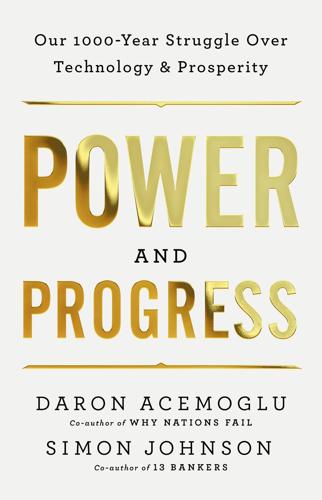
Power and Progress: Our Thousand-Year Struggle Over Technology and Prosperity
by
Daron Acemoglu
and
Simon Johnson
Published 15 May 2023
Arguably, however, his most influential work did not appear in an academic journal but in a short piece published in September 1970 in the New York Times Magazine, immodestly titled “A Friedman Doctrine.” Friedman argued that the “social responsibility” of business was misconstrued. Business should care only about making profits and generating high returns for their shareholders. Simply put, “The social responsibility of business is to increase its profits.” Friedman articulated an idea that was already in the air. The previous decades had witnessed stinging criticisms of government regulations and more voices in favor of the market mechanism. Nevertheless, the impact of the Friedman doctrine is hard to exaggerate. At one fell swoop, it crystallized a new vision in which big businesses that made money were heroes, not the villains that Ralph Nader and his allies painted them as.
…
Facebook deciding what is and what is not fit for people to see. 29. Monitoring workflow inside an Amazon fulfillment center. 30. Digital surveillance with Chinese characteristics: a machine for checking social credit scores in China. 31. Milton Friedman: “The social responsibility of business is to increase its profits.” 32. Ralph Nader: “The unconstrained behavior of big business is subordinating our democracy to the control of a corporate plutocracy that knows few self-imposed limits.…” 33. Ted Nelson: “COMPUTER POWER TO THE PEOPLE!” 34. Elon Musk: “Robots will be able to do everything better than us.”
…
Oxford: Oxford Martin School. Fried, Ina. 2015. “Google Self-Driving Car Chief Wants Tech on the Market Within Five Years.” Vox, March 17. www.vox.com/2015/3/17/11560406/google-self-driving-car-chief-wants-tech-on-the-market-within-five. Friedman, Milton. 1970. “A Friedman Doctrine—the Social Responsibility of Business Is to Increase Its Profits.” New York Times, September 13. www.nytimes.com/1970/09/13/archives/a-friedman-doctrine-the-social-responsibility-of-business-is-to.html. Gaither, Sarah E., Evan P. Apfelbaum, Hannah J. Birnbaum, Laura G. Babbitt, and Samuel R. Sommers. 2018. “Mere Membership in Racially Diverse Groups Reduces Conformity.”
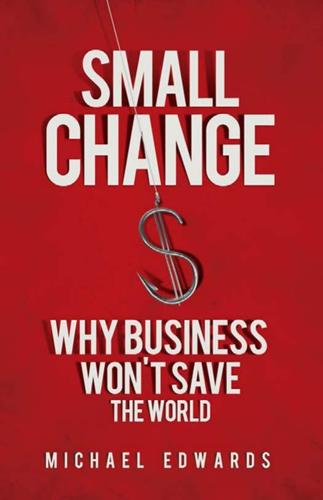
Small Change: Why Business Won't Save the World
by
Michael Edwards
Published 4 Jan 2010
Following our own self-interest to secure the basic necessities is only the first step toward the higher goal of achieving a virtuous life, attained by actualizing our capacity for what Smith called “benevolence.” Yet he was unable to integrate these two books into one coherent philosophy, sparking a conversation between efficiency and welfare that continues still today. Will philanthrocapitalism finally resolve Adam Smith’s dilemma? In conventional market thinking, “the social responsibility of business is to increase its profits,” as Milton Friedman famously declared almost forty years ago in the pages of the New York Times. That is because the invisible hand is supposed “to be beneficial for the people it orders,” maximizing social welfare as a by-product of self-interested but unconscious interactions, with some light regulation to ensure that business operates inside a framework of agreed-upon social rules.2 One of the virtues the high cost of mission drift 65 of markets is that, at least in theory, they can ensure that each resource is used where returns are highest and is combined with other resources in the most efficient way, even though producers and consumers do not coordinate their decisions.
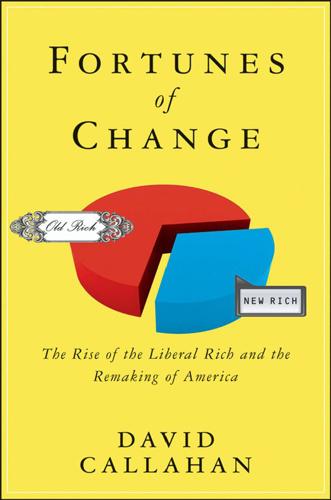
Fortunes of Change: The Rise of the Liberal Rich and the Remaking of America
by
David Callahan
Published 9 Aug 2010
This period saw rising foreign competition, a falling U.S. stock market, and new regulations around the environment and consumer product safety. The 1970s also saw growing demands for corporate affirmative action for women and minorities. Thus it was that Friedman hit a nerve when he reprised key points of Capitalism and Freedom in a 1970 article in the New York Times Magazine titled “The Social Responsibility of Business Is to Increase Its Profits.” The article, which was widely read and discussed, took aim at the executives who claimed that “business is not concerned ‘merely’ with profit but also with promoting desirable c10.indd 216 5/11/10 6:25:46 AM the corporate liberal 217 ‘social’ ends; that business has a ‘social conscience’ and takes seriously its responsibilities for providing employment, eliminating discrimination, avoiding pollution and whatever else may be the catchwords of the contemporary crop of reformers.”
…
Abrams, Disconnect: The Breakdown of Representation in American Politics (Norman: University of Oklahoma Press, 2009), 17. 10. The Corporate Liberal 1. Interview with Peter Bernstein and Annalyn Swan, Random House, www.randomhouse.com/catalog/display.pperl?isbn=9780307266 125& view=auqa. 2. “The Social Responsibility of Business Is to Increase Its Profits,” New York Times Magazine, September 13, 1970. 3. Jeffrey Hollender, What Matters Most: How a Small Group of Pioneers Is Teaching Social Responsibility to Big Business and Why Big Business Is Listening (New York: Basic Books, 2004), 10. 4. Ibid., 11–12. bnotes.indd 303 5/11/10 6:29:36 AM 304 notes to pages 222–238 5.

Exponential: How Accelerating Technology Is Leaving Us Behind and What to Do About It
by
Azeem Azhar
Published 6 Sep 2021
<https://octoverse.github.com/> [accessed 6 December 2020]. 43 Marc Levinson, Outside the Box: How Globalization Changed from Moving Stuff to Spreading Ideas (Princeton, NJ: Princeton University Press, 2020), pp. 61–67. 44 ‘HMM Algeciras: World’s Biggest Container Ship Arrives in Essex’, BBC News, 14 June 2020 <https://www.bbc.com/news/uk-england-essex-53041733> [accessed 7 December 2020]. 45 ‘Container Port Traffic (TEU: 20 Foot Equivalent Units)’, World Bank Data, <https://data.worldbank.org/indicator/IS.SHP.GOOD.TU> [accessed 31 July 2020]. 46 Binyamin Appelbaum, quoted in Azeem Azhar, ‘How Free-Market Economists Got It Wrong’, Exponential View, 27 December 2019 <https://www.exponentialview.co/p/-how-free-market-economists-got-it> [accessed 7 December 2020]. 47 Milton Friedman, ‘A Friedman Doctrine – The Social Responsibility of Business Is to Increase Its Profits’, New York Times, 13 September 1970 <https://www.nytimes.com/1970/09/13/archives/a-friedman-doctrine-the-social-responsibility-of-business-is-to.html> [accessed 13 July 2020]. 48 Dominic Ponsford, ‘Economist Readership Analysed: Detailed Breakdown of Brand Reach for H1 2020’, Press Gazette, 14 August 2020 <https://www.pressgazette.co.uk/economist-readership-brand-reach/> [accessed 7 December 2020].
…
, Wall Street Journal, 1 April 2019 <https://www.wsj.com/articles/will-ai-destroy-more-jobs-than-it-creates-over-the-next-decade-11554156299> [accessed 11 January 2021] Frey, Carl Benedikt, The Technology Trap: Capital, Labor, and Power in the Age of Automation (Princeton, NJ: Princeton University Press, 2019) Frey, Carl Benedikt, and Michael Osborne, ‘The Future of Employment: How Susceptible Are Jobs to Computerisation?’, Oxford Martin School working paper, 17 September 2013 <https://www.oxfordmartin.ox.ac.uk/publications/the-future-of-employment/> [accessed 14 September 2020] Friedman, Milton, ‘A Friedman Doctrine – The Social Responsibility of Business Is to Increase Its Profits’, New York Times, 13 September 1970 <https://www.nytimes.com/1970/09/13/archives/a-friedman-doctrine-the-social-responsibility-of-business-is-to.html> [accessed 13 July 2020] Frischmann, Brett, Alain Marciano and Giovanni Battista Ramello, ‘Retrospectives: Tragedy of the Commons after 50 Years’, Journal of Economic Perspectives 33(4), 2019, pp. 211–28 <https://doi.org/10.1257/jep.33.4.211> Giddens, Anthony, The Constitution of Society: Outline of the Theory of Structuration (Berkeley, CA: University of California Press, 1986) Giuliano, Genevieve, Sanggyun Kang, and Quan Yuan, ‘Agglomeration Economies and Evolving Urban Form’, The Annals of Regional Science, 63(3), 2019, pp. 377–398 <https://doi.org/10.1007/s00168-019-00957-4> Gofman, Michael, and Zhao Jin, ‘Artificial Intelligence, Human Capital, and Innovation’, SSRN Electronic Journal, October 2019 <https://doi.org/10.2139/ssrn.3449440> Greenberg, Andy, ‘The Untold Story of NotPetya, the Most Devastating Cyberattack in History’, Wired, 22 August 2018 <https://www.wired.com/story/notpetya-cyberattack-ukraine-russia-code-crashed-the-world/> [accessed 3 August 2020] Grim, Cheryl, ‘What Drives Productivity Growth?’
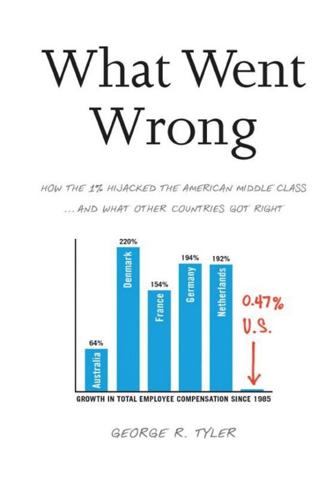
What Went Wrong: How the 1% Hijacked the American Middle Class . . . And What Other Countries Got Right
by
George R. Tyler
Published 15 Jul 2013
The Disparagement of Socially Responsible Stakeholder Capitalism The emergence of shareholder capitalism has its roots in the philosophy espoused by Milton Friedman in Capitalism and Freedom, which drew on the notions embodied in Ayn Rand’s rational selfishness theology.* In a 1970 New York Times Magazine article entitled “The Social Responsibility of Business Is to Increase Its Profits,” Friedman famously criticized the altruistic and socially accountable stakeholder capitalism practices then widespread in American business as reflecting “… a fundamentally subversive doctrine.” “There is one and only one social responsibility of business—to use its resources and engage in activities designed to increase its profits….”21 He repeatedly and loudly disparaged management of any firm that: “takes seriously its responsibilities for providing employment, eliminating discrimination, avoiding pollution, or whatever else may be the catchwords of the contemporary crop of reformers.
…
McElvaine, The Great Depression, 210. 16 Alfred Rappaport, Creating Shareholder Value (New York: Free Press/Simon and Schuster, 1986). 17 Andrew Martin, “In Company Town, Cuts but No Layoffs,” New York Times, Sept. 25, 2011. 18 Jena McGregor, “In Praise of Jim Sinegal, Costco’s No-Frills CEO,” Washington Post, Sept. 11, 2011. 19 Joseph A. McCartin, “The Strike That Busted Unions,” New York Times, Aug. 2, 2011. 20 Joseph A. McCartin, Ibid. 21 Milton Friedman, “The Social Responsibility of Business Is to Increase Its Profits,” New York Times Magazine, Sept. 13, 1970. 22 Milton Friedman, Ibid. 23 Michael C. Jensen and William H. Meckling, “Theory of the Firm: Managerial Behavior, Agency Costs, and Ownership Structure,” Journal of Financial Economics, vol. 3, no. 4, 1976. 24 John Plender, “Investing: Rules of Engagement,” Financial Times, July 11, 2010. 25 Justin Baer, Francesco Guerrera, and Richard Milne “A Need to Reconnect,” Financial Times, March 13, 2009. 26 Rakesh Khurana and Nitin Nohria, “Management Needs to Become a Profession,” Financial Times, Oct. 20, 2008. 27 Adam Smith, The Wealth of Nations, 368–69. 28 Joe Nocera, “Nice Wasn’t Part of the Deal,” New York Times, Aug. 1, 2009. 29 Adam Smith, The Wealth of Nations. 30 Milton Friedman, “Rethinking the Social Responsibility of Business,” Reason, October 2005. 31 David Magee, Jeff Immelt and the New GE Way (New York: McGraw-Hill Professional, 2009). 32 John P.
…
(economist), 130, 274, 444 Friedman, Benjamin (economist), 376, 384, 385, 466–67 Friedman, Milton (monetary economist), 25–26, 31-2, 124, 219 Adam Smith, opposed, 28,105 Advocated for shareholder capitalism and Ayn Rand’s philosophy, 102–4, 205 Capitalism and Freedom, 102 Chicago School and, 25–26, 28 deficits, endorsed, 204-5 efficient market hypothesis, 92, 103, 123, insider trading should be legal, 80–81 laissez-faire economics, resurrected, 32–33 monetary policy manipulation for political gain, 219 non-profit maximizing behavior, 123-5 Reagan and, 33, 80, 204 Reaganomics, intellectual veneer for, 131 shareholder capitalism, 47, 142, 178 “The Social Responsibility of Business Is to Increase Its Profits,” 102–3 stakeholder capitalism, criticized altruistic and socially accountable, 103 subprime home mortgages, 68 Friedrich Krupp AG, 167 Frum, David (Bush’s speechwriter), 33, 196, 224 Fuerst, Michael E. (University of Miami), 172–179, 375, 443, 494n63 Fukuyama, Francis (political scientist and author), 21, 241 G Gabaix, Xavier (Stern School of Business at NYU), 136, 137–38 Galbraith, James K.
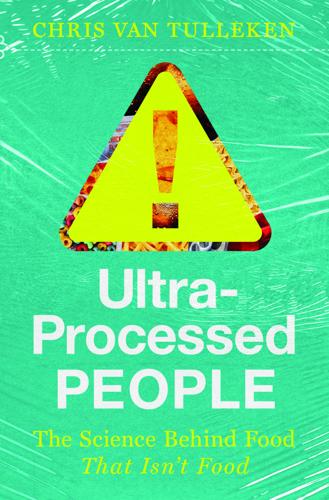
Ultra-Processed People: The Science Behind Food That Isn't Food
by
Chris van Tulleken
Published 26 Jun 2023
Faber led a revolution within Danone, making it the first company to legally dump the primacy of shareholders in place of other objectives around protecting the environment, their employees and suppliers. Faber declared that he had ‘toppled the statue of Milton Friedman’, the late Nobel economist who in 1970 wrote a seminal essay titled ‘The social responsibility of business is to increase its profits’.3 The board of directors disagreed with what Faber was up to, though. A public campaign was launched by Bluebell Capital and Faber lost his job in March 2021. Other efforts at activist investing that were met with wide public enthusiasm have stalled when it became clear that it would cost the actual investor money.
…
Post-farmgate food value chains make up most of consumer food expenditures globally. Nature Food 2021; 2: 417–25. 2 Justia Patents. Patents by inventors Gary Norman Binley. 2022. Available from: https://patents.justia.com/inventor/gary-norman-binley. 3 Friedman M. A Friedman doctrine – the social responsibility of business is to increase its profits. 1970. Available from: https://www. nytimes.com/1970/09/13/archives/a-friedman-doctrine-the-social-responsibility-of-business-is-to.html. 4 Sorkin AR, Giang V, Gandel S, et al. The pushback on ESG investing. 2022. Available from: https://www.nytimes.com/2022/05/11/business/dealbook/esg-investing-pushback.html. 5 BlackRock. 2022 climate-related shareholder proposals more prescriptive than 2021. 2022.
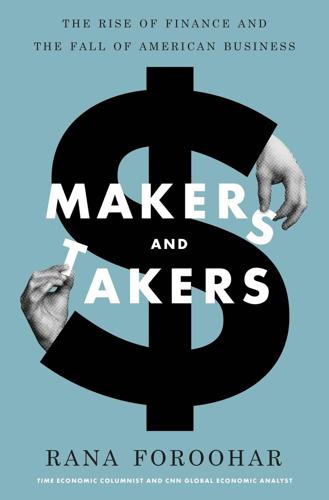
Makers and Takers: The Rise of Finance and the Fall of American Business
by
Rana Foroohar
Published 16 May 2016
The result was a very finance-driven approach to business education, in which the central questions were no longer about companies, but about markets—a way of thinking that one recent account describes as “free-market-oriented and interested only in the predictive power of theory, irrespective of the realism of assumptions.”32 This new approach may have been more theoretical than practical, but it was quickly embraced and became de rigueur for anyone who wanted a career in corporate America or the finance industry. MAXIMIZE VALUE—BUT FOR WHOM? The key assumption of the Chicago School, one that Milton Friedman himself upheld devoutly, was that the purpose of the corporation was to maximize financial value. As Friedman famously said back in 1970, “the social responsibility of business is to increase its profits.”33 This went hand in hand with another idea, which was that the share price of a firm always perfectly reflected all known information, and thus stock prices were the best overall measure of corporate value. This idea, known as the “efficient-market hypothesis,” eventually won its creator, another Friedman disciple and Chicago academic, Eugene Fama, the Nobel Prize.
…
Walgreen Foundation Records 1938-1956: Abstract,” Special Collections Research Center, University of Chicago Library. 32. Marion Fourcade and Rakesh Khurana, “From Social Control to Financial Economics: The Linked Ecologies of Economics and Business in Twentieth Century America,” Working paper 09-037 (Harvard Business School: 2013), 26. 33. Milton Friedman, “The Social Responsibility of Business Is to Increase Its Profits,” New York Times Magazine, September 13, 1970. 34. The third winner of the Nobel Prize of economics that year was the University of Chicago economist Lars Peter Hansen. 35. Author interview with Shiller for this book. 36. Author interview with Lo for this book. 37. Khurana, From Higher Aims to Hired Hands, 298. 38.
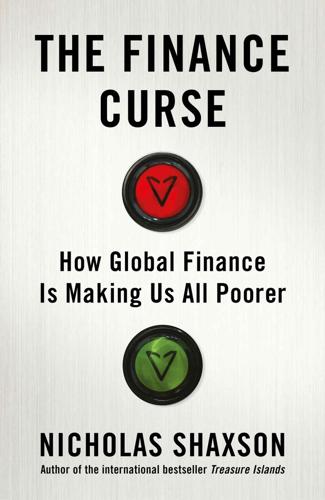
The Finance Curse: How Global Finance Is Making Us All Poorer
by
Nicholas Shaxson
Published 10 Oct 2018
Shareholders were just one among several key interest groups. This way of running companies was still the received wisdom at the end of the 1960s. In 1970, however, Milton Friedman threw a firebomb into this consensus with a violent article in the New York Times Magazine entitled ‘The Social Responsibility of Business Is to Increase its Profits’.6 Business leaders had but one duty, he wrote: to their shareholders. Namby-pamby ideas like social responsibility, paying taxes, paying employees or setting safety standards higher than the minimum were, in his view, ‘collectivist’ and ‘fundamentally subversive’. Business leaders who weren’t nakedly pursuing profit alone were ‘unwitting puppets of the intellectual forces that have been undermining the basis of a free society’.
…
122, 136–7 Cadbury’s 113 Cameron, David 48 Capital Group 84 capital requirements 148–63 Careline Homecare Limited 190–3, 202–5, 206, 216, 220 care sector 4, 190–4, 202–9, 216–17, 220, 228, 229, 234 Carillion 46, 231, 237 Carlyle Group 214 Carvalho, Arnaldo Lago de 233 Cassano, Joe 161 Cayman Islands 1, 2, 3, 59–60, 62, 63–7, 93, 125, 136, 140, 141, 145, 150, 151, 152, 153–4, 157, 162, 179, 188, 200, 211, 228, 242 Cayman Trust Law (1967) 62 Celtic Tiger (Ireland economy) 4, 115, 116–39 Central Bank of Ireland 129, 136 Cheney, Dick 244 Cherwell, Lord 53 Chicago School 28, 29, 30, 46, 71, 74, 98, 110, 197, 209, 253 China 13, 23, 50, 55, 84, 85, 87, 92, 104, 108, 110, 117, 138, 200, 258, 262–7, 272, 274 China General Nuclear Power Corporation (CGN) 262–3 Chinese Communist Party (CCP) 258, 264, 265, 266, 267, 272 Christensen, John 5, 11, 48, 67–8 Christensen, Professor Clayton 197, 198 Citibank/Citigroup 11, 59, 83, 129, 140, 159 City of London 37, 38, 84, 92–3, 183, 185, 252, 271, 272, 273; Big Bang 104, 143–4; capture of British establishment 13, 142, 166–7, 257–60, 265, 266; Chinese influence upon 262–7; evidence machine/lobbying and 257–60; financial brain drain and 6, 108, 259; global financial crisis and see global financial crisis; monopolies and 84; neoliberalism and 37, 38; organised crime and other abusive activities linked to 11–12, 93, 97, 141–6, 154, 166, 167, 168; penetrated and captured by reckless global finance (London loophole) 140–68; rebirth as global financial centre after fall of British empire 4, 10, 50–69; tax havens and see tax havens; Third Way and 92–3, 97, 98, 102, 104, 108, 109, 113; UK economy and growth in size of 5–14, 108, 218–40, 257–61, 262–74 City of London Corporation 257–8 Clearing House Group 130–1 Clinton, Bill 91, 97, 101, 114, 115, 122, 159 Clinton, Hillary 91, 100 Coase, Ronald: The Problem of Social Cost 72–4, 79 Coelho, Tony 98–9 Cohen, Benjamin J. 57 Cohen, Sheldon 254 collateralised debt obligations (CDOs) 165, 235 collateralised loan obligations (CLOs) 165, 200 Commodity Futures Modernisation Act (CFMA) (2000) 159–60 Community Mental Health Fund, Missouri 44 comparative advantage concept 105, 108 Competition and Markets Authority 70 competitiveness of nations/competitiveness agenda 8–9, 13–14, 23, 28–49, 62, 68, 70–1, 73, 80, 95, 97–8, 100–15, 130, 131, 132–3, 136, 142, 143, 149, 159, 160, 161, 164, 165, 180–1, 184–5, 207, 218, 241–3, 246–7, 250, 252–3, 258, 266, 267, 270, 271, 273 Conservative Party 37, 53, 71, 78, 102, 157, 165, 168, 220, 229 consultants 40, 41, 42–3, 66, 117, 230, 232, 233 controlled foreign company (CFC) reforms, U.K. 249–50 Cook Islands 177, 186, 272 Cornfield, Bernie 93 corporation: complexity of 3, 205–6; concept of 196–7 credit, control of 21 credit default swap (CDS) 128, 141, 147, 155–9, 165 Credit Suisse 11, 180, 183 crime/criminal money 12, 56, 58, 61, 62, 63, 64–5, 93–4, 142–3, 144, 145, 153, 154, 167–8, 175, 180, 187, 223, 264, 272, 273 Cromwell, William 22 Daily Mail 113, 251, 252 Darling, Alistair 257 Davidson, Charles 182, 189 Davidson, Kenneth 81, 252 Davies, Will 36, 39, 102 Deaton, Angus 181 debt 7, 34, 58, 69, 121, 152, 160, 165, 169, 186, 190, 193–6, 198–201, 205, 206–7, 208, 210, 215, 221, 234, 235, 244, 248, 262 Delaware, U.S. 181 Deloitte 235, 237 Delors, Jacques 100 Democratic Party, U.S. 39, 97, 98–100, 102, 141, 245 Deng Xiaoping 117 Depfa 133 deregulation, financial 13, 31, 35, 64–5, 68–9, 91, 97, 104, 107, 109, 117–18, 138, 142, 143, 146, 152, 159–60, 164, 165, 260 derivatives 12, 140–1, 142, 144, 146–7, 149, 151, 155, 158–60, 161, 164, 193 Desmond, Dermot 129–30 de Tocqueville, Alexis 75–6 Deutsche Bank 83, 95, 111, 160 Devereux, Professor Mike 243 Director, Aaron 71–2, 78, 79 DIRT (Deposit Interest Retention Tax) 136 Down’s Syndrome North East Association (UK) (DNSE) 169–70, 174 Drexel Burnham Lambert 161, 195 drugs: gangs/money 12, 61, 64–5, 92, 142–3, 145, 167, 185–6; pharmaceutical/Big Pharma 85–6, 126, 247 Dunbar, Nicholas 152, 161 dynamic scoring/dynamic modeling 253–4 East India Company 50, 75 Eddy, Bruce 44 Efficient Markets Hypothesis 150 Elf Affair 94, 187 Enron 46, 141, 165, 235–6 Epstein, Professor Gerald 10–11, 259; Overcharged: The High Costs of Finance 10– 11 Ernst & Young 163, 235, 238 Espino, Ovidio Diaz: How Wall Street Created a Nation 23 Essilor 82; EssilorLuxottica 82 Eurodollar markets/Euromarkets 55–9, 60, 61, 62, 63, 64, 68, 69, 77, 91, 93, 104, 142 European Central Bank (ECB) 137 European Commission (EC) 84, 94, 100, 111, 137; Liikanen Report (2012) 135 European Economic Community (EEC) 77, 98, 118, 123, 124–5 European Round Table of Industrialists (ERT) 100 European Union (EU) 98, 109–10, 111, 124, 132, 147, 238 Export Profits Tax Relief 118 Facebook 23, 71, 84, 88, 171, 173, 185, 226, 271, 274 fallacy of composition 107–8, 247 Fallon, Padraic 124 Fanning, John 126 Fantus Factory Location Service 40 Farm Aid 87–8 Federal Reserve Bank of New York 57 Ferguson, Niall: The Ascent of Money 242 Fiat 250 Finance Acts, Ireland: (1968) 120; (1987) 131 finance curse, concept of 3–14, 15, 18, 19, 22, 31, 37, 48, 68, 71, 103, 108, 111, 132, 136, 174, 184–5, 193, 198, 216, 228, 239, 257, 261, 265, 267, 269, 270, 271, 272, 273, 274 financial capture 13, 68, 96, 153, 257, 259, 265, 266 Financial Conduct Authority (FCA) 25–6, 246 financial crisis, global (2007–8) 4, 6, 25, 83, 90, 99, 109, 113, 114, 116, 128, 130, 133–4, 135–6, 140–68, 169, 195, 202, 224–5, 233, 235, 236, 240, 257 financialisation 2–4, 6, 9, 10, 11, 37, 68–9, 71, 88, 90, 174, 180, 185, 190, 191, 194, 198, 205, 217, 224, 225, 226, 228, 232, 259, 267, 274 Financial Services Authority (FSA) 104, 160, 161, 166, 167 Financial Stability Board (FSB) 83 Financial Times 68, 84, 94, 107, 146, 214, 218, 226, 232, 243, 256 Finger, Bernd 168 Fischel, William 38 Fordism 80 foreign direct investment (FDI) 110, 118–19, 123, 124, 132, 250 Fox News 71, 253 Franks, Oliver 52 Fraser, Ian: Shredded 227 free markets 18–19, 71–2, 99, 126, 128, 241 free-rider problem 30–1, 43, 47, 38 free trade 31, 50–1 Friedman, Milton 28, 30, 37, 59, 72, 73–4; ‘The Social Responsibility of Business Is to Increase Its Profits’ 196–7, 198, 209 Friedmaniacs 28, 30 FTSE 100 228, 238 Gapper, John 232–3 Gash, Tom 230 Gates, Bill 127, 185 Gauke, David 249 Gaydamak, Arkady 186 Gazprom 84 GDP (gross domestic product) 6, 8, 111, 112, 123, 147, 153, 174, 241, 245, 254, 256, 260, 266 General Electric (GE) 86–7 Gensler, Gary 140–1 Gibraltar 60, 63 Giddens, Anthony: The Third Way 105 Gilbert, Martin 83 Gilead 85–6 Giles, Chris 218 Glasman, Baron 258 Glass-Steagall Act (1933) 76, 147, 158–9 globalisation 10, 35, 59, 93, 94–5, 97, 98, 101, 102, 103, 106, 107, 109, 165, 177, 251, 254 Golden Age of Capitalism 34, 69, 91, 92, 118, 196, 251, 254–5 Goldman Sachs 113, 159, 160, 183, 213, 235, 242 Google 71, 88, 226, 271 Graphite Capital Partners VIII A LP 191–2, 205, 206 Great Depression (1929–39) 31, 98 Greenspan, Alan 75, 159, 160 gross national income (GNI) 112, 119, 122–3, 134 Guernsey 60, 181, 191, 220, 222 Hahneman, Daniel 181 Haldane, Andrew 225 Hands, Guy 181 Hansen, Lee 28 happiness, wealth and 181–3, 189 Harlech, Lord 34 Harrington, Brooke 186, 188 Hartnett, Dave 113 Harvard Business School 101, 196, 197 Harvie, Alicia 87–8 Harvoni 86 Haughey, Charles 114–15, 120–3, 129–30, 136 Hayek, Friedrich 35–6, 37, 59, 76; The Road to Serfdom 36, 37 Hayes, Jerry 229 Heaton, David 234 hedge funds 6, 13, 83, 104, 108, 128, 130–1, 140–1, 154, 164, 177, 178, 189, 193, 200, 209, 213, 214–15, 217, 233 Henry, James 166, 260 Hewlett-Packard 39–40 Hinkley C 262–3 HMRC 62, 104, 113, 168, 173, 234, 241, 242, 245, 246, 249, 252–4; Computable General Equilibrium model 241, 252–4 HNWI (high net worth individuals) 180; ultra-HNWI 180 Hodge, Margaret 168, 239 Hofri-Windogradow, Adam 180 Hong Kong 50, 130, 138, 171–2, 266 HSBC 12, 54, 83, 107–8, 167, 266 Hundred Group 242 Hunt Companies 221 HypoVereinsbank 133 Industrial Development Authority (IDA), Ireland 118, 124–5, 126, 129, 131, 135 inequality 4, 11, 31, 34, 36, 47, 48, 59, 90, 109, 138, 179, 187, 225, 251, 255, 256, 257, 259, 267–8, 270, 272, 274 inflation 34, 80, 107, 129 Innes, Abby 229 Institute for Fiscal Studies (IFS) 247 Intel 125 internal rate of return (IRR) 198, 211 International Financial Services Centre (IFSC), Dublin 128–35, 251 International Monetary Fund (IMF) 137, 164, 219, 250, 251, 257 International Public Partnerships Limited (INPP) 220–1 International Swaps and Derivatives Association (ISDA) 158 Intruders 113 Investec Wealth & Investment Limited 220 investment funds 2, 88, 110, 140 Investors Overseas Services (IOS) 93 Iran 53–4 Ireland: Celtic Tiger economy in 4, 114–15, 116–39 Isle of Man 60, 136 Jackson County, Missouri, U.S. 44 Jenkins, Robert 11 Jensen, Professor Michael 196, 197, 198, 209, 215 Jersey 1, 2, 3, 5, 60, 63, 67–8, 131, 136, 169, 171, 173, 174, 202, 221, 222, 223, 228, 258 Jiang Zemin 117 Johnson, Boris 218, 219, 222 Johnson County, Kansas, U.S. 41–4 Johnson, Paul 247 Johnson, Simon 257 Joly, Eva 187 Journal of Political Economy 29, 46 JP Morgan Chase 83, 95, 141, 146, 147, 155, 158, 160, 214 Juncker, Jean-Claude 94–5, 97, 102, 103, 104, 111, 114, 122 Kansas, U.S. 41–4, 244–5, 255–6 Kay, John 9 Kennedy, Edward 78–9 Keynes, John Maynard 31–2, 34, 37, 38, 52, 59, 68, 251 KKR (Kohlberg Kravis Roberts) 2, 3, 195, 214 Koch, Charles 74 Kohlberg Junior, Jerome 194, 195, 199 Kohl, Marius 95 KPMG 114, 235, 237, 238–9 Kraft Heinz 81, 113 Kravis, Henry 2, 195 Kroes, Neelie 110 Krugman, Paul: ‘Competitiveness: A Dangerous Obsession’ 105 Labour Party 77, 97, 102–5, 132, 192, 220, 247, 257 Lack, Simon 214; The Hedge Fund Mirage 214 Laffer, Arthur/Laffer curve 244–5, 254 Lazonick, Bill 225, 226 Leaver, Professor Adam 207, 224–5, 234 Lehman Brothers 140, 162–4 Leigh-Pemberton, Robin 145 LeRoy, Greg 40–1 leveraged buyout (LBO) 195–6 Levin, Carl 134 Liberty Global 250 Libor (London Inter-Bank Offered Rate), manipulation of 12, 85, 109, 166 Linares, Adolfo 185, 188 Linklaters 163 Lloyds Bank 52 Local Government Association (LCA) 224 Loch Alpine Economics 253 London School of Economics (LSE) 37, 105, 229 London Stock Exchange (LSE) 167, 220 London Whale 141 Long-Term Capital Management (LTCM) 140–1 Luxembourg 1, 2, 3, 13, 55–6, 92, 93–7, 98, 111–13, 125, 130, 138, 142, 166, 201, 211, 221, 222, 228, 243 Luxleaks scandal (2014) 95, 109 Luxottica 82 Lycamobile 168 Lydian Capital Partnership 202 Lynn, Barry 87, 88 Macdonald, Ken 168 Macmillan, Harold 34, 53–4 MacSharry, Ray: The Making of the Celtic Tiger 118, 127 Madoff, Bernie 94, 96 Madrid, Miguel de la 58 Major, John 220 Maloney, Carolyn 141 Manafort, Paul 183 Manne, Henry 74 Marchant, David 157 Marx, Karl 15, 18 Masters, Blythe 158 Maugham, Jolyon 156 Maurer, Ueli 45–6 Mazerov, Michael 255 McAlpin, Clovis 62 McCarthy, Joseph 29 McCarthy, Justine 119 McCreevy, Charlie 132 McDonald, Duff 197 Mellon, Tamara 208 mergers and acquisitions (M&A) 26, 71, 81, 82, 83, 84, 87, 99, 110, 155, 225, 226, 251 Metcalf, Stephen 36 Microsoft 125, 185 Midland Bank 34, 54–5 Milken, Michael 195 Missouri, U.S. 41, 43, 44, 244–5, 255 money laundering 12, 145–6, 167, 168, 183 Money Trust Investigation, U.S.
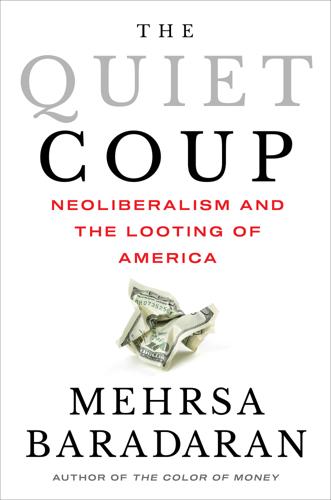
The Quiet Coup: Neoliberalism and the Looting of America
by
Mehrsa Baradaran
Published 7 May 2024
Roche, the target of the activist’s ire, was conciliatory, noting that although the company had earned the confidence of the majority of shareholders, “it was not a victory” in his eyes. “When even a small fraction of our stockholders—even if only one—is not convinced of our record of responsibility, then we are concerned.”21 Two weeks after GM made its announcement, The New York Times Magazine ran an article titled “A Friedman Doctrine: The Social Responsibility of Business Is to Increase Its Profits.” On the page opposite Milton Friedman’s words, the Times placed a picture of James Roche at a podium under GM’s logo, with a caption explaining that Roche was replying “to members of Campaign GM.” Although no one could have known it at the time, Friedman’s article would be the first salvo of the neoliberal revolution that would transform corporate law.
…
See also First Amendment Free Speech and Election Law Practice Group (Federalist Society), 150 Free to Choose (book by Friedman), 94 Free to Choose (PBS series), 94 free trade, xxiv, 60, 70, 231, 364, 365 Friedman, Milton, xxxix, 20–22, 26, 45, 46, 53, 54, 57, 63–67, 73, 79, 80, 83–86, 91, 92, 94, 127, 139, 156, 159, 161, 169, 183, 186, 189, 192, 194, 198–200, 206, 213, 215, 220, 221, 224, 227, 235, 239–40, 291, 304, 333, 334, 364, 370 Capitalism and Freedom, 20, 53, 91, 183, 186 Free to Choose, 94 A Monetary History of the United States, 1867–1960, 63 “Neoliberalism and Its Prospects,” xxxix, 46 “The Role of Government in Education,” 221 Friedman, Rose, 91 “Friedman Doctrine, A: The Social Responsibility of Business Is to Increase Its Profits,” 79–80 fringe lending, 212, 213, 215 Fritz, Harrison, 332 Frontera, Ernesto, 337 FTX, 342–45 Fukuyama, Francis, 38 Fuller, Lon L., 131–32 Furman, Jason, 302, 306 Furness, Betty, 78 fur trade, 198 fusionism, 186 futarchy, 339–40 futures markets, 361 G-10, 62 G-77, 49–50, 52, 60 Galbraith, John Kenneth, 33 Galor, Oded, 70 Galton, Francis, 362 GameStop, 331, 332, 341 Gandhi, Mahatma, 38, 42, 69, 94 Garn–St.

The Golden Passport: Harvard Business School, the Limits of Capitalism, and the Moral Failure of the MBA Elite
by
Duff McDonald
Published 24 Apr 2017
A piece of equipment produced on that assembly line leading from Sunday school to high school, from high school to college, from college to graduate school, from graduate school to the corporation.”17 HBS, the “machine” that made the managers, had been pumping out a faulty product, and the nation was demanding a recall. But HBS wasn’t offering refunds. Instead, it rolled out a whole new product line: the shiny, new Wall Street MBA. 41 The Subversive Nature of a Social Conscience In 1970, the economist Milton Friedman wrote an essay in the New York Times Magazine titled “The Social Responsibility of Business Is to Increase its Profits.” His argument was the opening salvo in what would come to be known as shareholder capitalism. Flouting the midcentury view (and that of the most influential faculty at HBS) that the best type of CEO was one with an enlightened social conscience, Friedman claimed that such executives were “highly subversive to the capitalist system.”
…
.: Penguin Books, 1974), p. 67. 15Ibid., p. 109. 16Lawrence Fouraker, letter to the president of Harvard, 1969–70, p. 328. 17Cohen, The Gospel According to the Harvard Business School, p. 67. Chapter 41: The Subversive Nature of a Social Conscience 1 Milton Friedman, “A Friedman Doctrine: The Social Responsibility of Business Is to Increase Its Profits,” New York Times Magazine, September 13, 1970. 2Eduardo Porter, “Motivating Corporations to Do Good,” New York Times, July 15, 2014, http://www.nytimes.com/2014/07/16/business/the-do-good-corporation.html. 3Joel Bakan, The Corporation: The Pathological Pursuit of Profit and Power (New York: Free Press, 2005), p. 34. 4Ibid., p. 36. 5https://hbr.org/2014/06/how-to-win-the-argument-with-milton-friedman.
…
Graduate Business Schools and American Business, 1945–60 (Aaronson), 194, 197, 247 7 Habits of Highly Effective People, The (Covey), 492 Shad, John, 169, 430–32; HBS ethics endowment, 431–32, 436–37 Shaeffer, Charles, 106 Shames, Laurence, 168, 169–70, 172, 173–74, 177, 281, 435, 529 Shaping the Waves (Cruikshank), 324 Shapiro, Benson, 300, 332, 333 shareholder value/profit-driven management, 6, 10, 36, 298, 315, 360–64, 366, 418, 442–43, 454, 469, 491, 524, 550, 567 Shaw, Arch, 43, 47, 116, 293 Sherman Antitrust Act, 200 Sicilia, David, 248, 251, 370 Siegel, Jeremy, 424 Siegel, Martin, 380 Silicon Valley, 234, 319, 321, 328; HBS grads and, 323; HBS outpost in, 328, 494; Rock and, 319–21 Simpson, James, 69 Skilling, Jeff, 76, 437–38, 456, 502, 512–24, 525 Skinner, Wickham, 498 Sklair, Leslie, 388 Slichter, Sumner H., 160 Sloan, Alfred, 61, 194, 245, 348 Small Business Management (Hosmer), 326 Smith, Adam, 43, 73, 246 Smith, Fred, 128 Smith, George, 289 Smith, Roger, 246 Snook, Scott, 439 Social Choice and Individual Values (Arrow), 275 Social Enterprise Initiative (SEI), 475 “Social Responsibility of Business Is to Increase its Profits, The” (Friedman), 360 “Social Significance of Business, The” (Donham), 433 Social Structure and Learning Climate (Orth), 398 Sokolow, Ira, 380 Sonnabend, Roger, 173, 185 Sony, 183, 534, 537 Sorkin, Andrew Ross, 480 Spar, Debora, 362, 363 Spater, George, 289 Spector, Bert, 141, 143, 184 Spender, J.
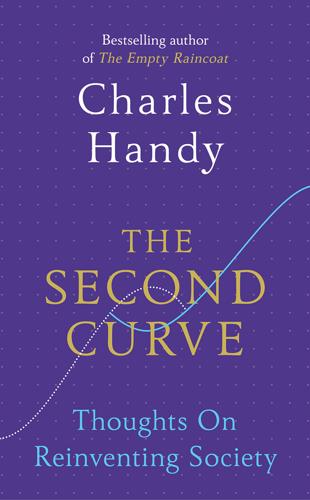
The Second Curve: Thoughts on Reinventing Society
by
Charles Handy
Published 12 Mar 2015
Meckling, who published a paper in 1976 with the unexciting title of ‘Theory of the Firm: Managerial Behavior, Agency Costs and Ownership Structure’ in the then little-known Journal of Financial Economics, although the roots of their idea can be found in the thesis of their one-time colleague Milton Friedman who argued, famously, back in 1970 that ‘the social responsibility of business is to increase its profits’. Set business free to do its job and all else would follow, he argued, society would grow and all would be better off. Jensen and Meckling’s paper went on to be the most quoted economics article in the world for the next decade or two. Jensen and Meckling argued that the firm was really a bundle of contractual relationships, that directors and managers were the agents of the owners and were not there for their own advantage.

Dirty Secrets How Tax Havens Destroy the Economy
by
Richard Murphy
Published 14 Sep 2017
Zucman, The Hidden Wealth of Nations: The Scourge of Tax Havens (Chicago: University of Chicago Press, 2015). 4.Philip Booth, ‘Oxfam’s 355 Economists Are Completely Wrong: Tax Havens Do Serve a Useful Purpose’, City AM, 10 May 2016. 5.Dan Mitchell, ‘Debating Tax Havens’, International Liberty, 13 July 2013, at danieljmitchell.wordpress.com. 6.M. Friedman, ‘The Social Responsibility of Business Is to Increase Its Profits’, New York Times Magazine, 13 September 1970. 7.Brad Walmsley, ‘The Corruption of Universal Suffrage: A New Analysis of the Relationship Between Tax, Consent, and the Tyranny of the Majority’, Institute of Economic Affairs, 5 June 2006, at iea.org.uk. 8.Quoted in Ken Blackwell, ‘Milton Friedman’s Property Rights Legacy’, Forbes, 31 July 2014, at forbes.com. 9.R.
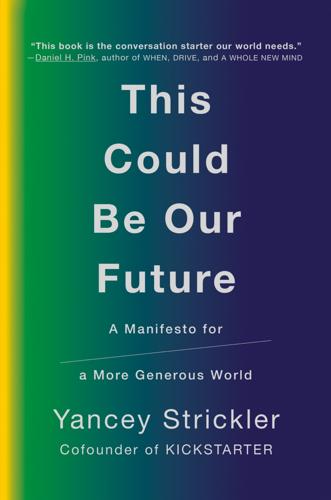
This Could Be Our Future: A Manifesto for a More Generous World
by
Yancey Strickler
Published 29 Oct 2019
what else to do: Reports that waste facilities outside of Philadelphia were suspected of burning their recycling came from the Guardian (“‘Moment of Reckoning’: US Cities Burn Recyclables after China Bans Imports,” February 2019). “our own worst enemies”: As reported in the Wall Street Journal (“Recycling, Once Embraced by Businesses and Environmentalists, Now Under Siege,” May 13, 2018) the case for financial maximization: Milton Friedman’s New York Times essay was titled “The Social Responsibility of Business Is to Increase Its Profits,” published on September 13, 1970. single goal: to maximize profitability: Background on what I call the Maximizing Class comes from several sources. Most important is analysis by economists William Lazonick and Mary O’Sullivan. In a paper called “Maximizing Shareholder Value: A New Ideology for Corporate Governance,” published in the journal Economy and Society in 2010, Lazonick and O’Sullivan detail the history of what I call financial maximization.

Empire of AI: Dreams and Nightmares in Sam Altman's OpenAI
by
Karen Hao
Published 19 May 2025
The US government subsequently embarked on a quest to refashion Chile’s economic policies to be more favorable to American business interests, launching a program in 1956 called “the Chile Project” to educate a hundred Chilean students at the University of Chicago under the intellectual tutelage of American economist Milton Friedman. Friedman was a towering figure in economics who would go on to receive a Nobel Prize in 1976 and whose ideas could best be summed up by the title of his influential 1970 op-ed in The New York Times: “The Social Responsibility of Business Is to Increase Its Profits.” Friedman stood for everything that developmental economics did not: zero government regulation, unfettered freedom for profit-driven companies, a path to the economic maturation of developing countries defined by facing outward, such as through liberal exports. As Naomi Klein details in her 2007 international bestseller The Shock Doctrine, the Chile Project was not education but indoctrination.
…
GO TO NOTE REFERENCE IN TEXT Long after the Spanish: Naomi Klein, The Shock Doctrine: The Rise of Disaster Capitalism (Picador, 2008), 55. GO TO NOTE REFERENCE IN TEXT In the 1950s and ’60s: Klein, The Shock Doctrine, 64. GO TO NOTE REFERENCE IN TEXT Friedman was a towering: Milton Friedman, “A Friedman Doctrine—the Social Responsibility of Business Is to Increase Its Profits,” New York Times, September 13, 1970, timesmachine.nytimes.com/timesmachine/1970/09/13/223535702.html?pageNumber=379. GO TO NOTE REFERENCE IN TEXT As Naomi Klein details: Klein, The Shock Doctrine, 61. GO TO NOTE REFERENCE IN TEXT under conditions fomented: James Doubek, “The U.S.
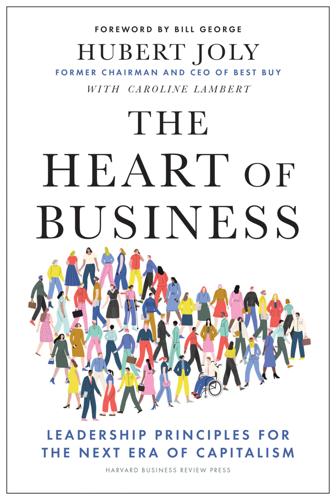
The Heart of Business: Leadership Principles for the Next Era of Capitalism
by
Hubert Joly
Published 14 Jun 2021
By enabling employees to realize their work fulfills a noble purpose, he calls for a refocusing of companies around employees in service to customers and the common good. Hubert makes a compelling case that pursuing a company’s purpose is superior to Milton Friedman’s dictate that “the social responsibility of business is to increase its profits.” He believes, and I agree, that sustainable profits are the successful outcome of organizations that are mission driven and focus on all their stakeholders. In the future, every company will need to focus on its purpose, or raison d’être, in order to establish legitimacy in serving society by creating value for all stakeholders.
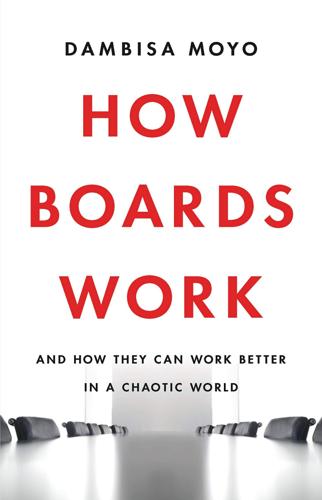
How Boards Work: And How They Can Work Better in a Chaotic World
by
Dambisa Moyo
Published 3 May 2021
London: SOAS University of London, 2014. www.soas.ac.uk/cedep-demos/000_P570_IEEP_K3736-Demo/unit1/page_26.htm. Fried, Jesse M., and Charles C. Y. Wang. “Short-Termism and Capital Flows.” Review of Corporate Finance Studies (forthcoming). Last modified November 25, 2018. https://papers.ssrn.com/sol3/papers.cfm?abstract_id=289516. Friedman, Milton. “The Social Responsibility of Business Is to Increase Its Profits.” New York Times, September 13, 1970. Fromm, Jeff. “How Much Financial Influence Does Gen Z Have?” Forbes, January 10, 2018. www.forbes.com/sites/jefffromm/2018/01/10/what-you-need-to-know-about-the-financial-impact-of-gen-z-influence/#2f7ceaa856fc. Fry, Richard. “Millennials Projected to Overtake Baby Boomers as America’s Largest Generation.”
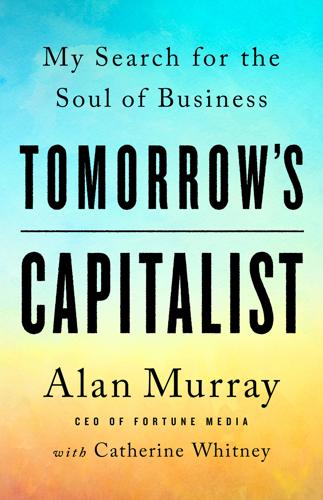
Tomorrow's Capitalist: My Search for the Soul of Business
by
Alan Murray
Published 15 Dec 2022
Marc Benioff. Trailblazer: The Power of Business as the Greatest Platform for Change. New York: Currency/Crown, 2019. CHAPTER 1: THE BIG CHANGE 1. Lanny Ebenstein. Milton Friedman: A Biography. New York: Palgrave Macmillan, 2007. 2. Milton Friedman. “A Friedman Doctrine—the Social Responsibility of Business Is to Increase Its Profits.” New York Times, September 13, 1970. 3. Milton Friedman. Capitalism and Freedom. Chicago: University of Chicago Press, 1962. 4. Adam Smith. An Inquiry into the Nature and Causes of the Wealth of Nations. London: W. Strahan and T. Cadell, 1776. 5. Friedman, “A Friedman Doctrine.” 6.
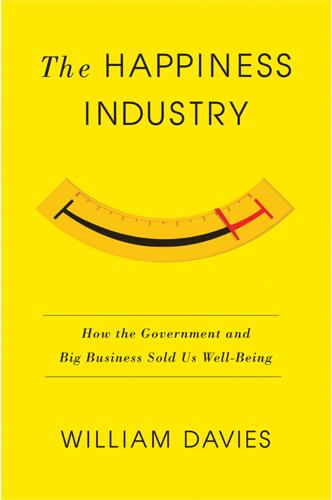
The Happiness Industry: How the Government and Big Business Sold Us Well-Being
by
William Davies
Published 11 May 2015
Norton & Company, 2009. 9Jessica Grogan, Encountering America: Humanistic Psychology, Sixties Culture and the Shaping of the Modern Self, New York: Harper Perennial, 2013. 10Hadley Cantril, The Pattern of Human Concerns, New Brunswick: Rutgers University Press, 1966. 11Quoted in Jamie Peck, Constructions of Neoliberal Reason, Oxford: Oxford University Press, 2010, 117. 12Andrew McGettigan, ‘Human Capital in English Higher Education’, paper given at Governing Academic Life, London School of Economics and Political Science, 25–26 June 2014. 13Edmund Kitch, ‘The Fire of Truth: A Remembrance of Law and Economics at Chicago, 1932–1970’, Journal of Law and Economics 26: 1, 1983. 14Ibid. 15George Priest, ‘The Rise of Law and Economics: A Memoir of the Early Years’, in Francesco Parisi and Charles Rowley, eds., The Origins of Law and Economics: Essays by the Founding Fathers, Cheltenham: Edward Elgar, 2005, 356. 16Milton Friedman, ‘The Social Responsibility of Business Is to Increase Its Profits’, The New York Times Magazine, 13 September 1970. 17Will Davies, The Limits of Neoliberalism: Authority, Sovereignty and the Logic of Competition, London: Sage, 2014. 18Nikolas Rose, ‘Neurochemical Selves’, Society, November/December, 2003; Nikolas Rose, Politics of Life Itself: Biomedicine, Power and Subjectivity in the Twenty-First Century, Princeton, NJ: Princeton University Press, 2007. 19Peter Kramer, Listening to Prozac, London: Fourth Estate, 1994. 20Alain Ehrenberg, The Weariness of the Self: Diagnosing the History of Depression in the Contemporary Age, Montreal: McGill-Queen’s University Press, 2010. 21David Healy, The Antidepressant Era, Cambridge, MA: Harvard University Press, 1997. 22As has been widely researched and commented on, antidepressants are only marginally more effective than placebos, and the effectiveness of placebos has been growing year on year.
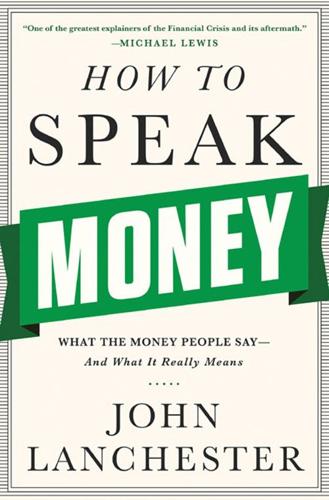
How to Speak Money: What the Money People Say--And What It Really Means
by
John Lanchester
Published 5 Oct 2014
_r=0. 65Originally published in the Economic Journal in 1965, the article is available at www.apec.umn.edu/grad/jdiaz/A%20theory%20of%20Allocation%20of%20Time%20-%20Becker.pdf. 66Marshall Jevons, The Fatal Equilibrium (New York: Random House, 1985), pp. 102–3. 67See boxofficemojo.com/alltime/adjusted.htm. 68See this riveting piece, “Prince Alwaleed and the Curious Case of Kingdom Holding Stock,” at www.forbes.com/sites/kerryadolan/2013/03/05/prince-alwaleed-and-the-curious-case-of-kingdom-holding-stock/. 69See en.wikipedia.org/wiki/List_of_countries_by_GDP_sector_composition. 70Ben Bernanke, at http://www.federalreserve.gov/newsevents/speech/bernanke20131108a.htm. 71Milton Friedman, ”The Social Responsibility of Business Is to Increase Its Profits,” New York Times, 13 September 1970. 72Adam Smith, An Inquiry into the Nature and Causes of the Wealth of Nations (Oxford: Clarendon Press, 1976), pp. 26–27. 73There’s a list of current government spreads at markets.ft.com/RESEARCH/markets/Government-Bond-Spreads. 74See www.theguardian.com/money/2013/apr/03/student-loan-debt-america-by-the-numbers. 75The original 1981 article founding tournament theory is available at www.jstor.org/discover/10.2307/1830810?
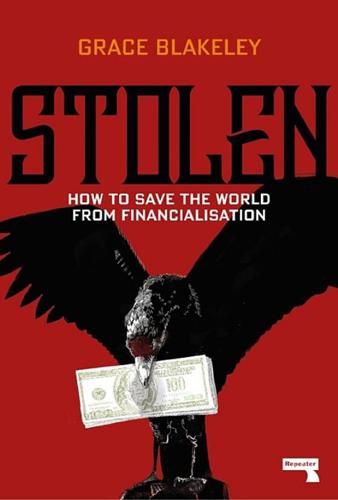
Stolen: How to Save the World From Financialisation
by
Grace Blakeley
Published 9 Sep 2019
These arguments ran contrary to the received wisdom in management theory, which held that businesses had responsibilities to a wide variety of stakeholders — workers, consumers, and governments for example. But with the rise of neoliberalism, the argument that — in the words of Milton Friedman — “the social responsibility of business is to increase its profits” gained traction.37 This view assumes that resources are scarce, so when companies use their resources in unproductive ways there are fewer to go around for everyone else. In this sense, doing anything other than maximising profits is wasteful and inefficient. From here, it is a short leap to arguing that the singular purpose of any corporation should be to maximise shareholder value — with the share price used as the proxy for profitability.
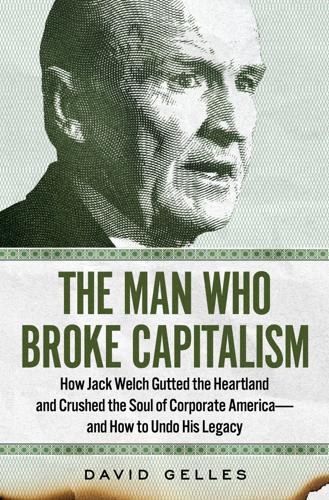
The Man Who Broke Capitalism: How Jack Welch Gutted the Heartland and Crushed the Soul of Corporate America—and How to Undo His Legacy
by
David Gelles
Published 30 May 2022
Friedman took Hayek’s central thesis and ran with it, zeroing in on what this meant for corporations. As Friedman saw it, companies should focus exclusively on the profitable production of goods and services, disregarding all other supposed obligations. In a seminal essay published in the New York Times in 1970, Friedman declared that “the social responsibility of business is to increase its profits.” That simple twist of logic—that companies should maximize profits before all else—became one of the most powerful ideas of the late twentieth century, providing intellectual justification for a wholesale rewriting of the social contract. Friedman disdained those who believed companies should do anything beyond making money.
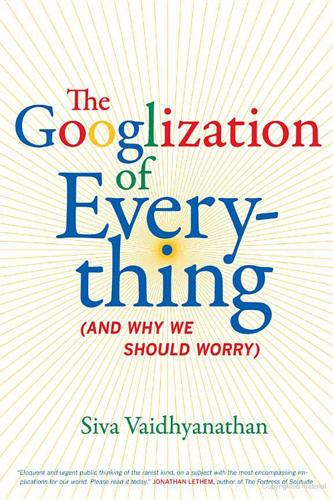
The Googlization of Everything:
by
Siva Vaidhyanathan
Published 1 Jan 2010
Robert Pear and Jackie Calmes, “Cost Concerns as Obama Pushes Health Issue,” New York Times, June 16, 2009. 63. Steve May, The Debate over Corporate Social Responsibility (Oxford: Oxford University Press, 2007); André Habisch, Corporate Social Responsibility across Europe (Berlin: Springer, 2005). 228 NOTES TO PAGES 43–53 64. Milton Friedman, “The Social Responsibility of Business Is to Increase Its Profits,” New York Times Magazine, September 13, 1970. 65. For an early account of the ways a clumsily regulated Web would fail to foster democratic values if left to the tumult of market forces, see Andrew Chin, “Making the World Wide Web Safe for Democracy: A Medium-Specific First Amendment Analysis,” Hastings Communications and Entertainment Law Journal (Comm/Ent) 19 (1996): 309. 66.
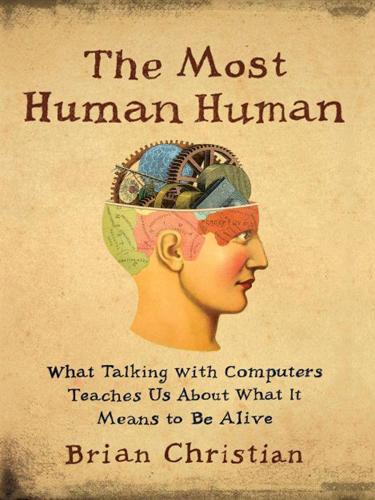
The Most Human Human: What Talking With Computers Teaches Us About What It Means to Be Alive
by
Brian Christian
Published 1 Mar 2011
Ramachandran and Sandra Blakeslee, Phantoms in the Brain: Probing the Mysteries of the Human Mind (New York: William Morrow, 1998). 10 Alan Turing, “On Computable Numbers, with an Application to the Entscheidungsproblem,” Proceedings of the London Mathematical Society, 1937, 2nd ser., 42, no. 1 (1937), pp. 230–65. 11 Ada Lovelace’s remarks come from her translation (and notes thereupon) of Luigi Federico Menabrea’s “Sketch of the Analytical Engine Invented by Charles Babbage, Esq.,” in Scientific Memoirs, edited by Richard Taylor (London, 1843). 12 Alan Turing, “Computing Machinery and Intelligence,” Mind 59, no. 236 (October 1950), pp. 433–60. 13 For more on the idea of “radical choice,” see, e.g., Sartre, “Existentialism Is a Humanism,” especially Sartre’s discussion of a painter wondering “what painting ought he to make” and a student who came to ask Sartre’s advice about an ethical dilemma. 14 Aristotle’s arguments: See, e.g., The Nicomachean Ethics. 15 For a publicly traded company: Nobel Prize winner, and (says the Economist) “the most influential economist of the second half of the 20th century,” Milton Friedman wrote a piece in the New York Times Magazine in 1970 titled “The Social Responsibility of Business Is to Increase Its Profits.” The title makes his thesis pretty clear, but Friedman is careful to specify that he means public companies: “The situation of the individual proprietor is somewhat different. If he acts to reduce the returns of his enterprise in order to exercise his ‘social responsibility’ [or in general to do anything whose end is ultimately something other than profit], he is spending his own money, not someone else’s … That is his right, and I cannot see that there is any objection to his doing so.” 16 Antonio Machado, “Proverbios y cantares,” in Campos de Castilla (Madrid: Renacimiento, 1912). 17 Will Wright, quoted in Geoff Keighley, “Simply Divine: The Story of Maxis Software,” GameSpot, www.gamespot.com/features/maxis/index.html. 18 Ludwig Wittgenstein, Philosophical Investigations, translated by G.
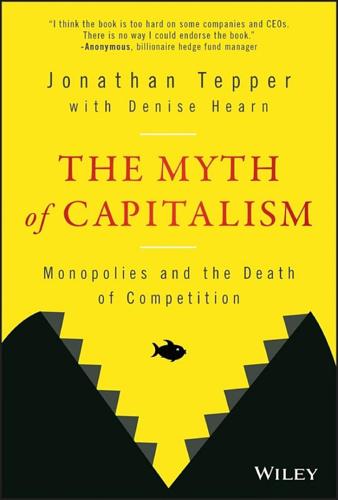
The Myth of Capitalism: Monopolies and the Death of Competition
by
Jonathan Tepper
Published 20 Nov 2018
And how much control and influence should shareholders have over company decisions? In the 1970s Milton Friedman threw his hat in the ring in an attempt to answer these questions. Following a now infamous essay by Friedman, who would later win the Nobel Prize in economics, a new intellectual dogma took hold. Friedman argued that the only “social responsibility of business is to increase its profits” and that “a corporate executive is an employee of the owners of the business.” By this, he meant that the CEO is “employed” by the shareholders and must serve them above all other parties, including workers, consumers, or society. It was a fine thought, within reason. Shareholders in fact do own the company.
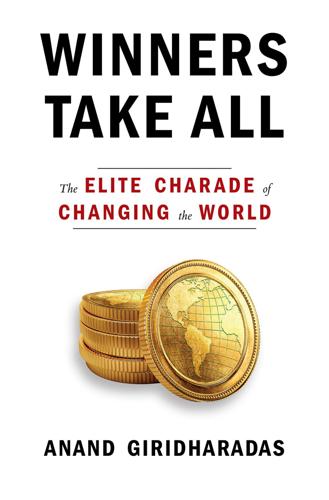
Winners Take All: The Elite Charade of Changing the World
by
Anand Giridharadas
Published 27 Aug 2018
Of course, there was waste involved: A lot of capital was not put to the most efficient use. And then in the 1970s and ’80s, as ascendant neoliberalism spawned changes in law and culture, it came to be viewed as the first duty of a business to maximize value for shareholders. “The social responsibility of business is to increase its profits,” the Chicago School economist Milton Friedman declared in the New York Times Magazine in the fall of 1970. Wall Streeters trained in the protocols saw their influence rise as their way of evaluating a company, and their degree of say in how it should be run, gradually took over.
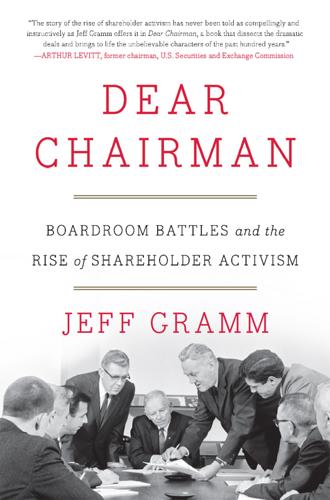
Dear Chairman: Boardroom Battles and the Rise of Shareholder Activism
by
Jeff Gramm
Published 23 Feb 2016
Thus, when a corporate raider wins control of Pacific Lumber and clear-cuts thousands of acres of old-growth redwoods, I view this as a regrettable result of unchecked capitalism rather than an indictment of corporate raiding or shareholder activism. Many pundits believe Milton Friedman’s 1970 article in the New York Times Magazine, “The Social Responsibility of Business Is to Increase Its Profits,” ushered in a new era of shareholder primacy. But when you read Friedman’s piece today, there is something inevitable about his deconstruction of corporate purpose. In the pages of this book we’ll see how and why shareholders have won control of corporate America. Take it from Ralph Nader himself, who in 2014 released a public statement criticizing Liberty Media for “lowballing Sirius XM’s shareholder value” in a buyout offer.6 In today’s world, where even Ralph Nader’s activism promotes shareholder value, other public company stakeholders have been marginalized.
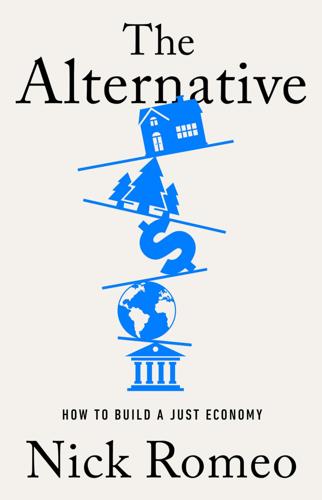
The Alternative: How to Build a Just Economy
by
Nick Romeo
Published 15 Jan 2024
“In short, positive economics is, or can be, an ‘objective’ science, in precisely the same sense as any of the physical sciences,” he wrote.23 Friedman argued that political disagreements will diminish once everyone accepts the results of this “science.” Put differently, all politics is just misunderstood economics. In fact, the opposite is closer to the truth: most economics is misunderstood politics. Many consider Friedman’s 1970 essay “The Social Responsibility of Business Is to Increase Its Profits,” with its unabashed embrace of profit maximization, a founding document of neoliberalism. But this 1953 essay claiming economics as a natural science may be the more destructive text. If this is true, the “discovery” that businesses should only care about profits is like a law of the physical universe.

Flying Blind: The 737 MAX Tragedy and the Fall of Boeing
by
Peter Robison
Published 29 Nov 2021
It was the fulfillment of a long shift away from the communitarian ideals that had dominated American politics, economy, and culture from the New Deal of the 1930s to the Great Society of the 1960s. That consensus was just starting to fray when Milton Friedman, the Reaganites’ favorite economist, argued what was then still the contrarian viewpoint in the New York Times Magazine in 1970: “The social responsibility of business is to increase its profits.” Fifty years later, communities are fragile, workers insecure, and families stressed. It isn’t hard to see the connection to a half century’s embrace of narrow corporate self-interest over collective responsibility. The federal government’s mismanagement of the COVID-19 crisis was only the most visible sign of decay in American institutions—the effects are felt in virtually every aspect of life, from soaring health-care costs to skyrocketing inequality to wildfire smoke blanketing American cities for weeks on end because of escalating carbon emissions.

The Raging 2020s: Companies, Countries, People - and the Fight for Our Future
by
Alec Ross
Published 13 Sep 2021
Between 2017 and 2019: “High Insulin Costs Are Killing Americans,” Right Care Alliance, accessed April 30, 2020, https://rightcarealliance.org/actions/insulin/. Like Alec, Jesy Boyd: Cindy Sherer Boyd, interview with Amy Martyn, May 2, 2020. But the following month: Cindy Sherer Boyd, interview. In 1962, in his book: Milton Friedman, “A Friedman Doctrine—The Social Responsibility of Business Is to Increase Its Profits,” New York Times, September 13, 1970, https://www.nytimes.com/1970/09/13/archives/a-friedman-doctrine-the-social-responsibility-of-business-is-to.html. The United States had been the world leader: Peri E. Arnold, “William Taft: Domestic Affairs,” University of Virginia Miller Center, accessed July 20, 2020, https://millercenter.org/president/taft/domestic-affairs.
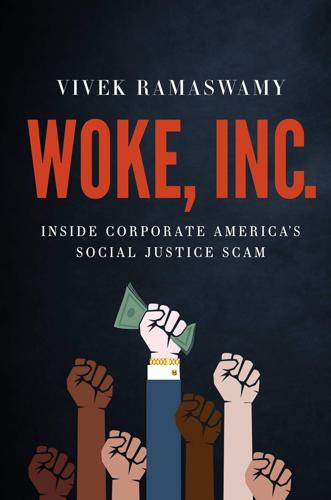
Woke, Inc: Inside Corporate America's Social Justice Scam
by
Vivek Ramaswamy
Published 16 Aug 2021
Heller, Martin C., and Keoleian, Gregory A. “Beyond Meat’s Beyond Burger Life Cycle Assessment: A Detailed Comparison between a Plant-Based and an Animal-Based Protein Source.” 2018 CSS Report, University of Michigan: Ann Arbor 1-38. CHAPTER 6 1. Friedman, Milton. “A Friedman Doctrine—The Social Responsibility of Business Is to Increase Its Profits.” The New York Times, 13 Sept. 1970, www.nytimes.com/1970/09/13/archives/a-friedman-doctrine-the-social-responsibility-of-business-is-to.html. 2. Schwab, Klaus. “Davos Manifesto 1973: A Code of Ethics for Business Leaders.” World Economic Forum, 1973, www.weforum.org/agenda/2019/12/davos-manifesto-1973-a-code-of-ethics-for-business-leaders/. 3.
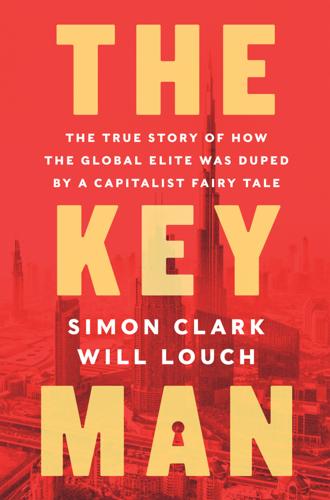
The Key Man: The True Story of How the Global Elite Was Duped by a Capitalist Fairy Tale
by
Simon Clark
and
Will Louch
Published 14 Jul 2021
CHAPTER 7: IMPACT INVESTING his Gospel: Andrew Carnegie, “The Gospel of Wealth, and Other Timely Essays,” Carnegie Corporation of New York, 2017, first published in 1889, www.carnegie.org/publications/the-gospel-of-wealth/ women in Africa: Oxfam, “Time to Care,” January 2020, oxfamilibrary.openrepos itory.com/bitstream/handle/10546/620928/bp-time-to-care-inequality-200120-en.pdf 129 Afghans: The World Bank, data.worldbank.org/indicator/NY.GDP.PCAP.CD?locations=PK for shareholders: Milton Friedman, “A Friedman Doctrine—The Social Responsibility of Business Is to Increase Its Profits,” New York Times, September 13, 1970, www.nytimes.com/1970/09/13/archives/a-friedman-doctrine-the-social-responsibility-of-business-is-to.html “a new alternative”: Nick O’Donohoe, Christina Leijonhufvud, and Yasemin Saltuk, “Impact Investments: An Emerging Asset Class,” JP Morgan Global Research, November 29, 2010, thegiin.org/assets/documents/Impact%20Investments%20an%20Emerging%20Asset%20Class2.pdf Sir Ronald Cohen: Catholic Relief Services, “2018 Impact Investing—Welcoming Remarks,” published on September 6, 2018, YouTube video, https://www.youtube.com/watch?
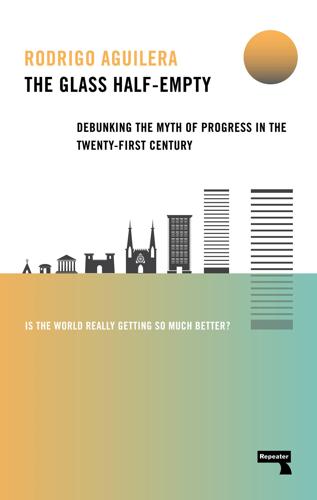
The Glass Half-Empty: Debunking the Myth of Progress in the Twenty-First Century
by
Rodrigo Aguilera
Published 10 Mar 2020
An article in the New York Times Magazine describes the reasons why the US Justice Department was so reluctant to go after bankers in the wake of the crisis: Eisinger, J. “Why Only One Top Banker Went to Jail for the Financial Crisis”, The New York Times, 30 Apr. 2014, https://www.nytimes.com/2014/05/04/magazine/only-one-top-banker-jail-financial-crisis.html 29 Friedman, M., “The Social Responsibility of Business is to Increase its Profits”, New York Times Magazine, 13 Sep. 1970, http://umich.edu/~thecore/doc/Friedman.pdf 30 Wolf, N., “This Global Financial Fraud and its Gatekeepers”, Guardian, 14 Jul. 2012, https://www.theguardian.com/commentisfree/2012/jul/14/global-financial-fraud-gatekeepers 31 Apparently Google’s overlords were concerned that employees were taking it literally and objecting to some of the company’s profit-making proposals: Moyer, J.W., “Alphabet, now Google’s overlord, ditches ‘Don’t be evil’ for ‘do the right thing’”, Washington Post, 5 Oct. 2015, https://www.washingtonpost.com/news/morning-mix/wp/2015/10/05/alphabet-now-googles-overlord-ditches-dont-be-evil-in-favor-of-do-the-right-thing/ 32 Andrews, E.L., “Greenspan concedes error on regulation”, New York Times, 23 Oct. 2008, https://www.nytimes.com/2008/10/23/business/worldbusiness/23iht-24greenspan.17202367.html 33 “Your Company is not a Democracy”, Entrepreneur Europe, 30 Jun. 2010, https://www.entrepreneur.com/article/207280 34 Wadhwa, V., “Democracy is a great thing, except in the workplace”, Washington Post, 6 Jul. 2016, https://www.washingtonpost.com/news/innovations/wp/2016/06/07/democracy-is-a-great-thing-except-in-the-workplace/ 35 Barro, R.J., “Democracy and Growth”, NBER Working Paper Series, 4909, Oct. 1994, https://www.nber.org/papers/w4909.pdf 36 The idea that sociopathy is rampant among CEOs and senior managers is not an urban legend although studies vary from 4-5% to as many as one fifth of high level executives. de Vries, M.F.R., “The Psychopath in the C Suite: Redefining the SOB”, INSEAD, 2012, https://sites.insead.edu/facultyresearch/research/doc.cfm?
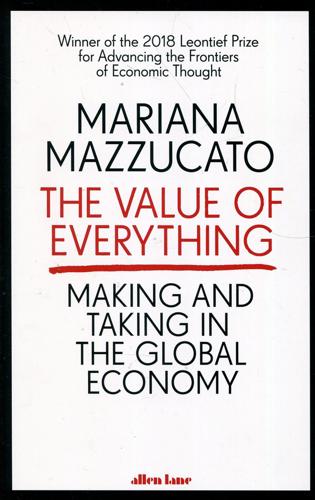
Value of Everything: An Antidote to Chaos The
by
Mariana Mazzucato
Published 25 Apr 2018
Back in the 1970s, as the economic crisis and stagnation of the decade impaired the performance and profitability of the corporate sector, shareholder dissatisfaction made shareholder returns the principal aim of the corporation. In 1970, Milton Friedman published in the New York Times Magazine an article which became the founding text of the shareholder value movement and, in many ways, of corporate management in general. Titled ‘The Social Responsibility of Business Is to Increase its Profits', Friedman's article advanced the idea that America's economic performance was declining because a cardinal principle of mainstream economics - that firms maximize profits - was being violated. There was no longer any punishment for managers who failed to profit-maximize.
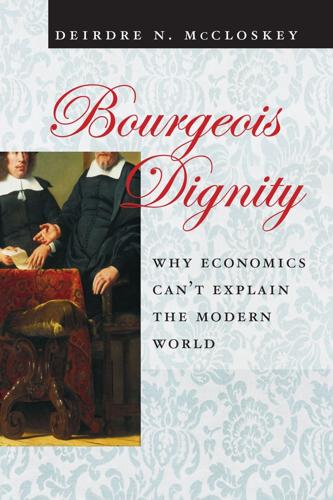
Bourgeois Dignity: Why Economics Can't Explain the Modern World
by
Deirdre N. McCloskey
Published 15 Nov 2011
He was not: he had one conversation with Pinochet, telling him to pay attention to the money supply. Or, to take a more academic example about this defender of market-tested betterment, in a famous article in the New York Times Magazine in 1970 Friedman argued, as the headline put it, that “The Social Responsibility of Business Is to Increase Its Profits.”16 Following the conventions of big-time journalism the headline, which is what most people know about the article, was not chosen by Friedman himself but was plucked out of the article by a clever writer of headlines. Friedman was in fact arguing that a society with more wealth can better pursue its transcendent goals, and that more wealth for such noble purposes is produced by maximizing profits.
…
Frey, Donald F. 2012. Review of Olivier Zunz, Philanthropy in America: A History. EH.net (January). http://eh.net/book_reviews/philanthropy-in-america-a-history/ Friedman, Benjamin M. 2005. The Moral Consequences of Economic Growth. New York: Knopf. Friedman, Milton. 1970. “The Social Responsibility of Business is to Increase Its Profits.” New York Times Magazine, September 13. Friedman, Milton. 1989. “We Have Socialism. Q.E.D.” New York Times, December 31. http://www.nytimes.com/2008/10/19/opinion/19opclassic.html. Frost, Robert. 1946. The Poems of Robert Frost. New York: Modern Library. Fuchs, R. H. 1978.
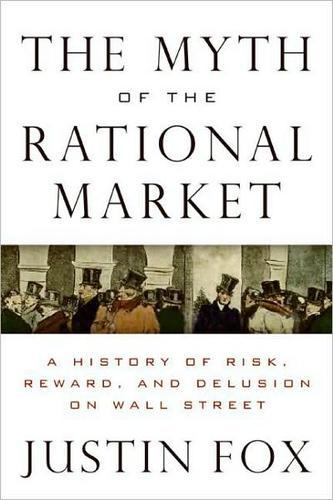
The Myth of the Rational Market: A History of Risk, Reward, and Delusion on Wall Street
by
Justin Fox
Published 29 May 2009
Buchanan and Gordon Tullock, The Calculus of Consent: Logical Foundations of Constitutional Democracy (Ann Arbor, Mich.: University of Michigan Press, 1962), is generally seen as the founding document of the public choice school, although Tullock credits earlier works by Scottish scholar Duncan Black. 21. Milton Friedman, “A Friedman Doctrine—The Social Responsibility of Business is to Increase its Profits,” New York Times Magazine, Sept. 13, 1970, 32–33, 122. 22. New York Times Magazine, Letters, Oct. 4, 1970, 21, 63. 23. This seemed like an excellent opportunity to put in an enthusiastic plug for Marc Levinson, The Box: How the Shipping Container Made the World Smaller and the World Economy Bigger (Princeton: Princeton University Press, 2006). 24.
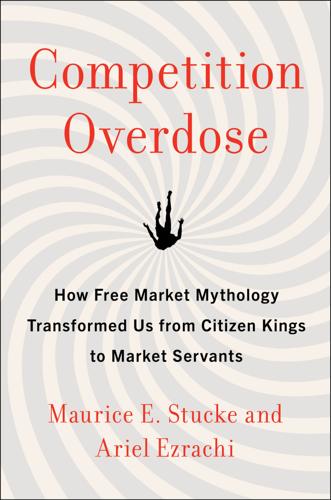
Competition Overdose: How Free Market Mythology Transformed Us From Citizen Kings to Market Servants
by
Maurice E. Stucke
and
Ariel Ezrachi
Published 14 May 2020
About 59 percent of graduates who reported purpose in their jobs said they had a high sense of well-being. Only 6 percent of students who had a low purpose at work said they had great well-being. 49.Bates College, “Purposeful Work: Aligning Who You Are with What You Do,” https://www.bates.edu/purposeful-work/. 50.Milton Friedman, “The Social Responsibility of Business Is to Increase Its Profits,” New York Times Magazine, September 13, 1970, https://nyti.ms/2J9d0xS (the incentives are to use the company “resources and engage in activities designed to increase its profits so long as it stays within the rules of the game”). 51.Stanley Milgram, “Behavioral Study of Obedience,” Journal of Abnormal & Social Psychology 67, no. 4 (October 1963): 371–378, http://dx.doi.org/10.1037/h0040525. 52.Philip Zimbardo, The Lucifer Effect: Understanding How Good People Turn Evil (New York: Random House, 2008), 273–75. 53.Zimbardo, The Lucifer Effect, 273. 54.Zimbardo, The Lucifer Effect, 274. 55.Simon Baron-Cohen, The Science of Evil: On Empathy and the Origins of Cruelty (New York: Basic Books, 2011), 183 (discussing how empathy is one of the most valuable resources in the world, in effectively anticipating and resolving interpersonal problems). 56.Zimbardo, The Lucifer Effect, 274. 57.Sergey Brin and Lawrence Page, “The Anatomy of a Large-Scale Hypertextual Web Search Engine,” paper presented at the Seventh International World-Wide Web Conference (Brisbane Australia, April 14–18, 1998), http://ilpubs.stanford.edu:8090/361/. 58.Zimbardo, The Lucifer Effect, 274. 59.Zimbardo, The Lucifer Effect, 274. 60.Zimbardo, The Lucifer Effect, 274. 61.Stanley Milgram, “The Perils of Obedience,” Harper’s Magazine, December 1973, 77, https://harpers.org/archive/1973/12/the-perils-of-obedience/. 62.
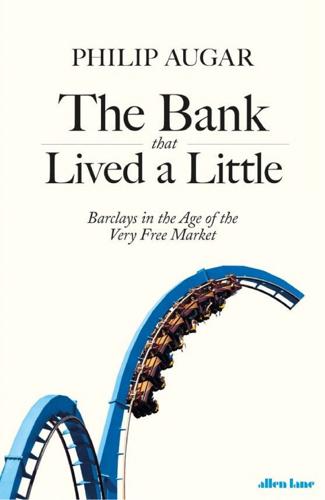
The Bank That Lived a Little: Barclays in the Age of the Very Free Market
by
Philip Augar
Published 4 Jul 2018
Geoffrey Owen, The Rise and Fall of Great Companies: Courtaulds and the Reshaping of the Man-Made Fibres Industry, Oxford University Press, Oxford, 2010, p. 119 2. Courtaulds Textiles Annual Report 1990, p. 5 3. Owen, Rise and Fall of Great Companies, p. 184 4. Milton Friedman, ‘The social responsibility of business is to increase its profits’, New York Times Magazine, 13 September 1970. Management’s ‘responsibility is to conduct business in accordance with their [shareholders] desires, which generally will be to make as much money as possible while conforming to the basic rules of society’. This idea was quickly picked up by other academics – notably Alfred Rappaport of the North Western University Business School – management consultants and investment bankers. 5.
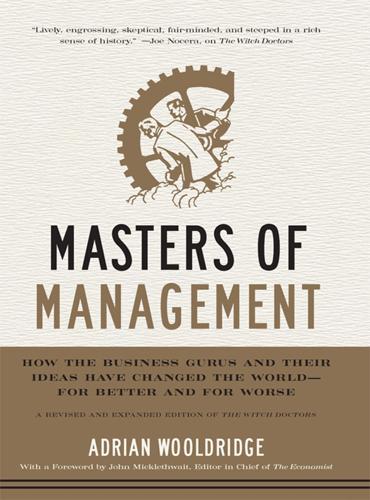
Masters of Management: How the Business Gurus and Their Ideas Have Changed the World—for Better and for Worse
by
Adrian Wooldridge
Published 29 Nov 2011
McKinsey & Company, Shaping the New Rules of Competition: UN Global Compact Participant Mirror, July 2007. 10. Joseph Schumpeter, Capitalism, Socialism and Democracy (London: George Allen & Unwin, 1943), p. 219. 11. Ann Bernstein, The Case for Business in Developing Economies (Johannesburg: Penguin, 2010), pp. 149–50. 12. Milton Friedman, “The social responsibility of business is to increase its profits,” The New York Times Magazine, September 13, 1970. 13. David Vogel, The Market for Virtue (Washington, DC: Brookings Institution, 2006), p. 135. 14. Darrell Rigby and Barbara Bilinear, Management Tools and Trends, (Bain & Company, 2009). 15. John Browne, Beyond Business (London, Weidenfeld & Nicolson, 2010), pp. 194–96. 16.
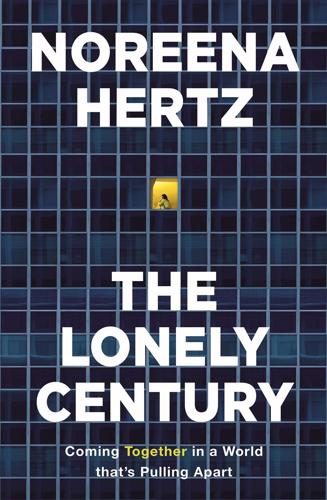
The Lonely Century: How Isolation Imperils Our Future
by
Noreena Hertz
Published 13 May 2020
Hand, The Wellbeing of Nations: Meaning, Motive, and Measurement (New York: Wiley, 2014). 20 Noreena Hertz, The Silent Takeover (Random House, 2002), 17–20. 21 See here too Diane Coyle’s work in this area, e.g., GDP: A Brief But Affectionate History (Princeton University Press, 2014). 22 ‘Business Roundtable Members’, Business Roundtable, https://www.businessroundtable.org/about-us/members. 23 Milton Friedman, ‘The Social Responsibility of Business is to Increase Its Profits,’ New York Times magazine, 13 September 1970. 24 ‘Business Roundtable Redefines the Purpose of a Corporation to Promote “An Economy That Serves All Americans”’, Business Roundtable, 19 August 2019, https://www.businessroundtable.org/business-roundtable-redefines-the-purpose-of-a-corporation-to-promote-an-economy-that-serves-all-americans. 25 Julia Carrie Wong, ‘Amazon execs labeled fired worker “not smart or articulate” in leaked PR notes’, Guardian, 3 April 2020, https://www.theguardian.com/technology/2020/apr/02/amazon-chris-smalls-smart-articulate-leaked-memo. 26 Chris Smalls, ‘Dear Jeff Bezos, instead of firing me, protect your workers from coronavirus’, Guardian, 2 April 2020, https://www.theguardian.com/commentisfree/2020/apr/02/dear-jeff-bezos-amazon-instead-of-firing-me-protect-your-workers-from-coronavirus. 27 Julia Carrie Wong, ‘Amazon execs labeled fired worker “not smart or articulate” in leaked PR notes’. 28 ‘AG James’ Statement on Firing of Amazon Worker Who Organized Walkout’, Office of the New York State Attorney General, https://ag.ny.gov/press-release/2020/ag-james-statement-firing-amazon-worker-who-organized-walkout. 29 Brad Smith, ‘As we work to protect public health, we also need to protect the income of hourly workers who support our campus’, Microsoft, 5 March 2020, https://blogs.microsoft.com/on-the-issues/2020/03/05/covid-19-microsoft-hourly-workers/. 30 See for example Republican Senator Josh Hawley’s bill in July 2019 to curb smartphone addiction by banning the ‘infinite scroll’ of social media feeds, and limiting an individual’s social media usage to thirty minutes a day across all devices, Emily Stewart, ‘Josh Hawley’s bill to limit your Twitter time to 30 minutes a day, explained’, Vox, 31 July 2019, https://www.vox.com/recode/2019/7/31/20748732/josh-hawley-smart-act-social-media-addiction); or EU industry chief Thierry Breton’s warnings in February 2020 that should major tech platforms fail to adequately curb hate speech and disinformation, tougher rules and penalties would be forthcoming (‘EU threatens tougher hate-speech rules after Facebook meeting’, DW, 17 February 2020, https://www.dw.com/en/eu-threatens-tougher-hate-speech-rules-after-facebook-meeting/a-52410851). 31 ‘Camden Council tackles the climate crisis’, see video at: https://youtu.be/JzzWc5wMQ6s.
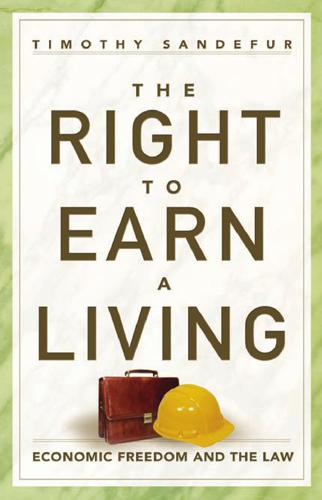
The Right to Earn a Living: Economic Freedom and the Law
by
Timothy Sandefur
Published 16 Aug 2010
Santa Clara County v. Southern Pacific Railroad, 118 U.S. 394 (1886). 78. Railroad Tax Cases, 13 F. 722, 746–47 (C.C.D. Cal. 1882). 79. Ibid. at 747–48. 80. Ibid. 81. Robert L. Raymond, “The Genesis of the Corporation,” Harvard Law Review 19 (1906): 353. 82. Milton Friedman, “The Social Responsibility of Business Is to Increase Its Profits,” New York Times Magazine, September 13, 1970. Interesting responses to Friedman are found in Roger Donaway, “Private I: Was Milton Friedman Pro-Capitalist?” New Individualist, April 2007; and Roger Donaway, “Private I: The Lengthened Shadow of a Businessman,” New Individualist, May 2007. 83.
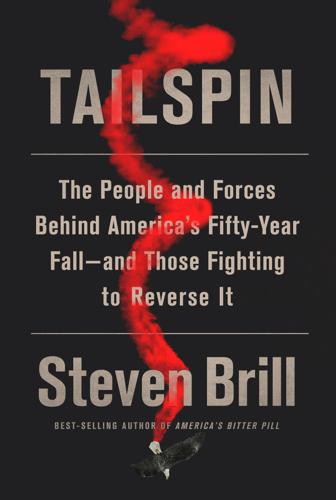
Tailspin: The People and Forces Behind America's Fifty-Year Fall--And Those Fighting to Reverse It
by
Steven Brill
Published 28 May 2018
Nobel laureate economist Milton Friedman, who died in 2006, would spin in his grave if he thought arguments like that, especially the concern for those “externalities,” were picking up steam. Friedman—the champion of extreme deregulation and the free market privatization of longtime governmental functions, such as education—famously wrote an article in The New York Times Magazine in 1970 declaring that “The social responsibility of business is to increase its profits.” The management of a corporation, he argued, worked for its shareholders and only its shareholders. If managers paid attention to that responsibility, and only that responsibility, the free market would function in a way that made everyone better off. Friedman’s manifesto could not have come at a better time to make a splash in the business community.

Capitalism in America: A History
by
Adrian Wooldridge
and
Alan Greenspan
Published 15 Oct 2018
They forced their CEOs to be more ruthless with a combination of carrots and sticks: the average salary of the boss of a Fortune 500 company increased from 40 times as much as a factory worker in 1980, to 84 times as much in 1990, to 475 times as much in 2000, but at the same time the average CEO tenure declined. CEOs responded by getting rid of surplus staff, cutting unnecessary expenses, and focusing on performance. Milton Friedman provided the intellectual justification for this more dog-eat-dog approach with his 1970 article “The Social Responsibility of Business Is to Increase Its Profits.” Six years later, two finance professors at Rochester University, Michael Jensen and William Meckling, elaborated on his insights in “Theory of the Firm: Managerial Behavior, Agency Costs and Ownership Structure,” which went on to be the most widely cited academic article about business ever written.8 Jensen and Meckling argued that companies are always distorted by a tension between the owners (who want to get the best return for their money) and their agents (who will always try to feather their own nests).

Evil Geniuses: The Unmaking of America: A Recent History
by
Kurt Andersen
Published 14 Sep 2020
According to the economist Mariana Mazzucato, it became the modern “founding text…in many ways, of corporate management.” It was written by Milton Friedman, the University of Chicago libertarian economist, and published across five pages of The New York Times Magazine under the headline A FRIEDMAN DOCTRINE—THE SOCIAL RESPONSIBILITY OF BUSINESS IS TO INCREASE ITS PROFITS. Friedman had become famous during the 1960s, as the decade of free speech and anything-goes outlandishness made his outlandish ideas seem worthier of consideration in respectable circles. The opening spread of the splashy Times article is decorated with headshots of a few of the new breed of meddling crypto-socialists—an EPA official, a federal consumer protection bureaucrat, members of Nader’s legal team that was prodding GM to reduce car emissions and hire more black people.
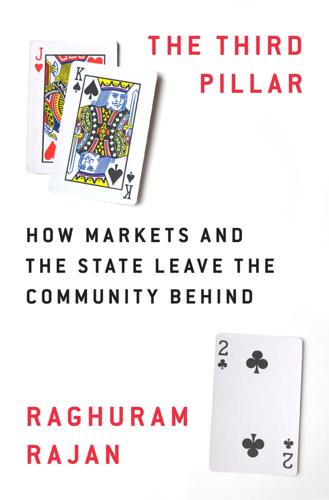
The Third Pillar: How Markets and the State Leave the Community Behind
by
Raghuram Rajan
Published 26 Feb 2019
Sherwin Rosen, “The Economics of Superstars,” The American Economic Review 71, no. 5 (December 1981): 845–58. 39. Raghuram Rajan and Julie Wulf, “The Flattening Firm: Evidence from Panel Data on the Changing Nature of Corporate Hierarchies,” The Review of Economics and Statistics 88, no. 4 (November 2006) 759–73. 40. Milton Friedman, “The Social Responsibility of Business Is to Increase Its Profits,” The New York Times Magazine, September 13, 1970. 41. Michael Jensen and Kevin J. Murphy, “Performance Pay and Top-Management Incentives,” Journal of Political Economy 98, no. 2 (April 1990): 225–64. 42. Andrei Shleifer and Lawrence H. Summers, “Breach of Trust in Hostile Takeovers,” in Corporate Takeovers: Causes and Consequences, ed.
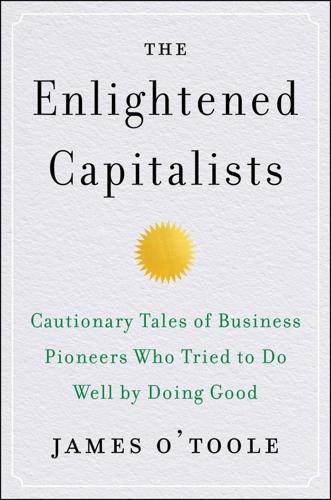
The Enlightened Capitalists
by
James O'Toole
Published 29 Dec 2018
“Takeover Defences Will Not Stop Short-Termism,” editorial, Financial Times, April 11, 2018. 10. “A New Chapter,” Economist, August 15, 2015. 11. Lynn Stout, The Shareholder Value Myth (San Francisco: Berrett-Koehler, 2012), 3. 12. Stout, 26. 13. The citation usually referenced for the Friedman is “The Social Responsibility of Business Is to Increase Its Profits,” New York Times Magazine, September 1970. In fact, Friedman first pronounced the doctrine in 1962 in his book Capitalism and Freedom (Chicago: University of Chicago Press, 1962). 14. Andrew Hill, “Twitter Should Not Crush the Idealists and Their Co-op Dream,” Financial Times, February 13, 2017. 15.
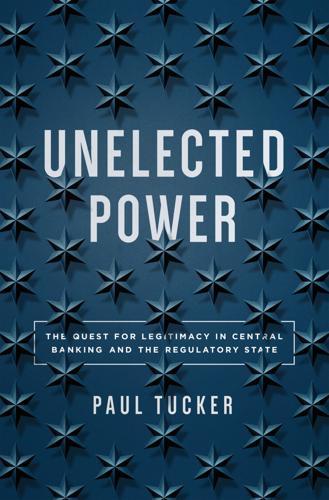
Unelected Power: The Quest for Legitimacy in Central Banking and the Regulatory State
by
Paul Tucker
Published 21 Apr 2018
In The Federal Reserve System after Fifty Years. US Congress House of Representatives, Committee on Banking and Currency, 1133–78. Washington, DC: US Government Printing Office. ________. The Optimum Quantity of Money. New Brunswick, NJ: Transaction Publishers, 1969. ________. “A Friedman Doctrine: The Social Responsibility of Business Is to Increase Its Profits.” New York Times, September 13, 1970. Friendly, Henry J. The Federal Administrative Agencies: The Need for Better Definition of Standards. Cambridge, MA: Harvard University Press, 1962. Fukuyama, Francis. The Origins of Political Order. New York: Farrar, Straus and Giroux, 2011. ________.
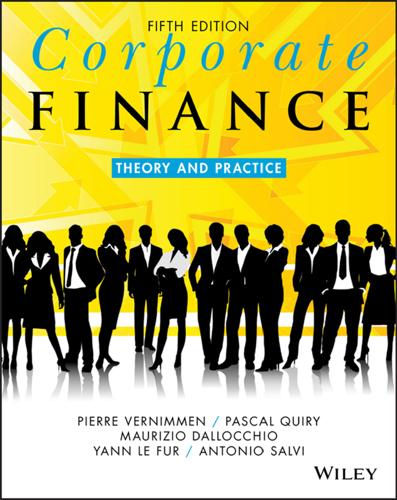
Corporate Finance: Theory and Practice
by
Pierre Vernimmen
,
Pascal Quiry
,
Maurizio Dallocchio
,
Yann le Fur
and
Antonio Salvi
Published 16 Oct 2017
Dobbs, T. Koller, Measuring long-term performance, The McKinsey Quarterly, special edition: Value and Performance, 17–27, 2005. P. Fernandez, J. Aguirreamalloa, L. Corres, Shareholder value creators in the S&P 500: 1991–2010, Working Paper IESE, February 2011. M. Friedman, The social responsibility of business is to increase its profits, New York Times Magazine, September 13, 1970. B. Madden, CFROI: A Total System Approach to Valuing a Firm, Butterworth-Heinemann, 1998. For more on EVA and economic profit: R. Bernstein, An empirical analysis of EVA as a proxy for market value added, Financial Practice and Education, 7, 41–49, 1997.